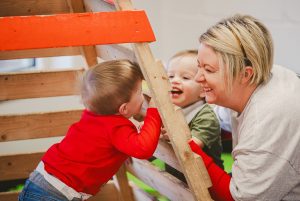Why You Should Pursue a Career in Early Childhood Education
The early years of a child’s life can have an incredible impact on their future. They’re not only learning colors, words, shapes and numbers — they’re learning how to interact with others, explore the world, and understand and express their own emotions. It’s a great responsibility to be an early childhood professional, but it’s also greatly rewarding.
“I know I’m making a difference, not only in a child’s very early years of life, but also a parent’s life,” said Jenny Fleming, a program specialist at the Nebraska Department of Education in the Office of Early Childhood. “As a parent, there is no greater feeling when going to work every day than knowing that my young child is being loved and cared for in a safe, nurturing, quality environment with someone who wants to see my child grow and be successful.”
Early childhood professionals work with young children (birth through age eight) and their families. They work in a variety of settings and may also be referred to as teachers, child care providers or interventionists. The profession requires skilled, experienced, educated and dedicated workers, and while it may be a field that is often pursued by women, any gender can excel and find fulfillment working with young children.
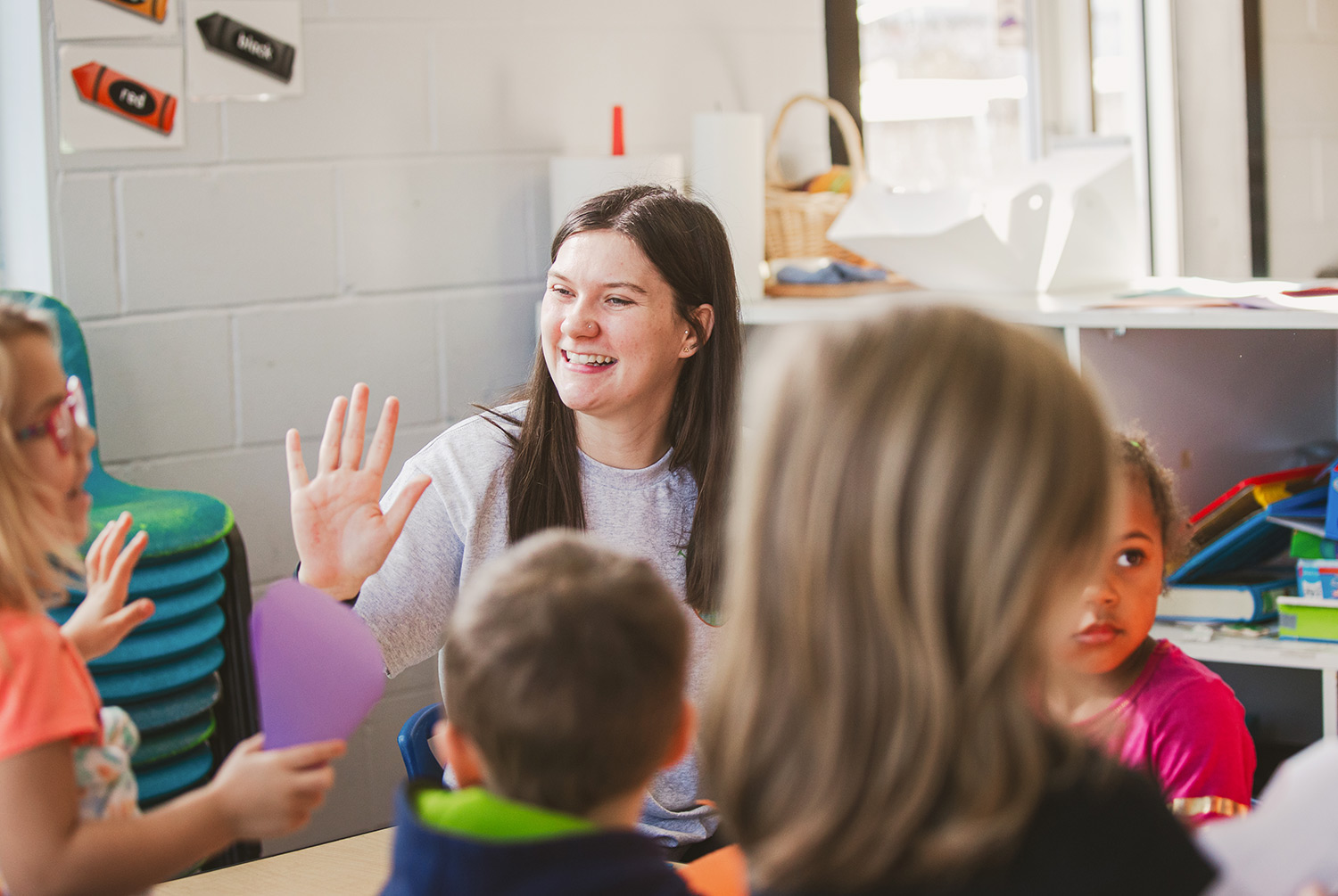
Early childhood career paths
A common misconception about the early childhood profession is that there are limited job options and few ways to advance a career. But once you obtain the skills to get started in the field, there are many different jobs to pursue both immediately and along your career path.
“Since graduating with a Bachelor’s degree in Early Childhood Education, I’ve had a variety of roles in the field,” Jenny said. “I’ve taught infants through preschoolers, worked as a home visitor/family support worker, special education paraprofessional, director and assistant director in early childhood programs, and now, I’m a program specialist.”
In her current role, Jenny coordinates trainings for the Environment Rating Scales and the CLASS, observation tools used by Step Up to Quality to assess the quality of early childhood programs. She also has the advantage of working with a talented team of observers who go out into programs and complete the observations, making sure the programs are ready for them. Since she had been a teacher earlier in her career, her path prepared her for this role. She can relate to the educators who are receiving observations and help ease their nerves.
Jen Burkey, a Step Up to Quality coach, has also had the pleasure of a winding career path that has fit her needs along the way, always with the constant of children’s education. After getting her Bachelor’s degree in Elementary Education, she worked as a substitute teacher for first and third grade, as an evening lead teacher for a learning center, and upon chance, found her passion for early childhood.
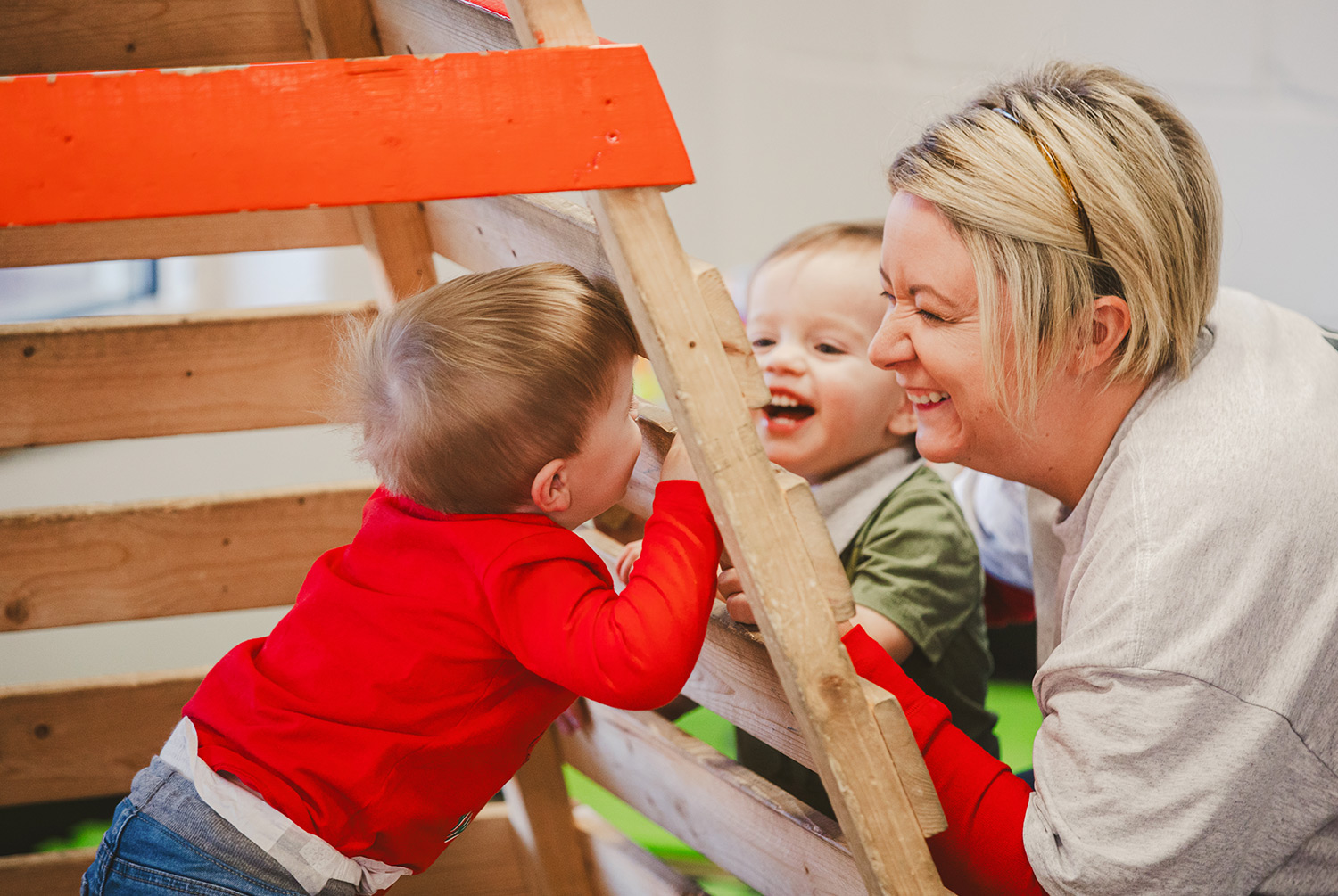
“As I was home with my own son, I began helping friends during the day with their little ones,” Jen said. “It became clear to me that I loved the three to six age group. All of the hands-on play, trips to parks, zoo visits and walks were never a burden to me. I realized this was where I felt so appreciated, needed and successful. Many outside individuals commented on my patience and how it took a special person for that age. This was the light for me!”
After that point, Jen’s kids grew older and attended school full time. She was offered a position at a preschool, an opportunity to take a further step in her career with an age group that she loves and align with her kids’ schedules.
After many wonderful years at the preschool, Jen reflected on her priorities and decided to move forward with becoming a Step Up to Quality coach, allowing her to have a more flexible schedule to visit her grown kids and dad while slowing down and enjoying her personal life.
“I love the chance to support and partner with teachers, mentor people, engage with kids in the classroom, and help educators create classrooms where the students are the center of learning through play,” Jen said. “What was a gift or talent I had to become a teacher, I can now share through giving my time to others.”
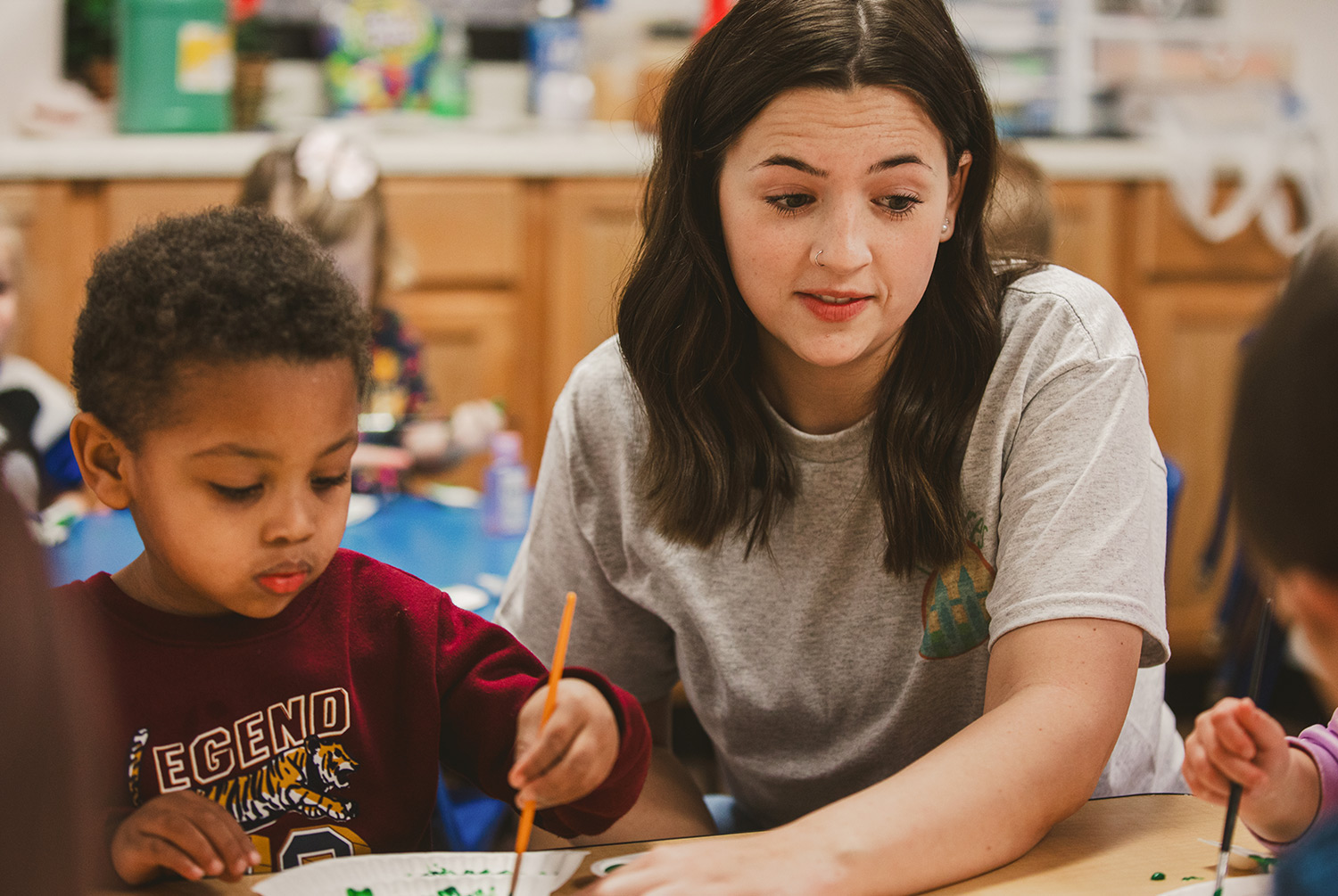
Advancing in the early childhood field
Whether you’re considering getting started in the early childhood field or are unsure where to go next in your career, it’s important to reflect on your “why.”
“A colleague of mine often asks in trainings ‘what is your why?’” Jenny Fleming said. “Ask yourself, ‘Why did I choose to be in this field? Why do I stay? What makes me smile every day when I go to work?’ If your answer is the children, know you’re right where you should be! It’s okay to explore the opportunities within the field and talk with others. Just always remember to ask what your ‘why’ is.”
Everyone will feel stuck at some point in their career, whether it’s at the beginning or somewhere along the way. In these moments, look to others, whether they’re advisors, colleagues, friends in the field or someone you look up to. It’s okay to ask for advice, and they may point you in a direction you never considered. This is a field that requires continuous reflection and learning.
“There are so many early childhood initiatives and support fields. Instead of staying on the same track, you could become a part of a different initiative,” Jen Burkey said. “For example, instead of a classroom teacher, become a trainer, mentor or coach. Education will always be a field where there is a constant need everywhere. This is a chance to make a difference during important, formative years and use your creativity to reach so many.”
How to Strengthen Communication between Parents and Providers
Children often spend their day with teachers and child care providers just as much as their parents, which means intentional, open communication between parents and providers is an important aspect of quality care and successful outcomes. Providers are knowledgeable in early education and development, and parents are experts on their own child.
Whether you’re a parent looking for tips on forging that relationship, or a provider who wants to take their communication to the next level, we’re glad you’re here to learn more about strengthening communication in early childhood education settings.

Tips for parents to improve communication with providers
Here are a few ways to open new avenues of communication and bring more purpose to the ways you communicate with providers.
Let’s start with what’s happening now. If a teacher or provider has scheduled touchpoints with you to discuss how your child is doing, this is the time to have a conversation — which means you should come prepared with your own questions. It’s easy to forget to prepare for these touchpoints, especially when you’re not leading them. Consider asking questions like, “What is my child’s favorite activity? Are there any social issues I should know about? What can I do at home to help?”
Between these touchpoints, there can be other ways to check in with your child’s provider. A good starting point is asking them what their preferred method of communication is, like texting, scheduled phone calls or face-to-face interaction around pick-up or drop-off time.
Consider the nature of your conversation and how long it may take: Is it a quick hello or expression of gratitude? That may be appropriate for a short text or face-to-face chat. Is it a concern about your child? Schedule a sit-down or phone call. Teachers and providers really do want to communicate with parents, but their attention is first focused on the children in their care, so be respectful of their availability by asking ahead of time before broaching a topic that could take more than a few minutes to discuss.
If you’re a parent on the search for a new provider, we recommend using Step Up to Quality’s free Find a Provider tool. This online resource will help you find providers near you who are enrolled in Step Up to Quality — which means they’re committed to strengthening the quality of their practices and are held to our quality communication standards. Check out our visitation checklists that include conversation starters for infants, toddlers, preschool and school-age care settings, too!
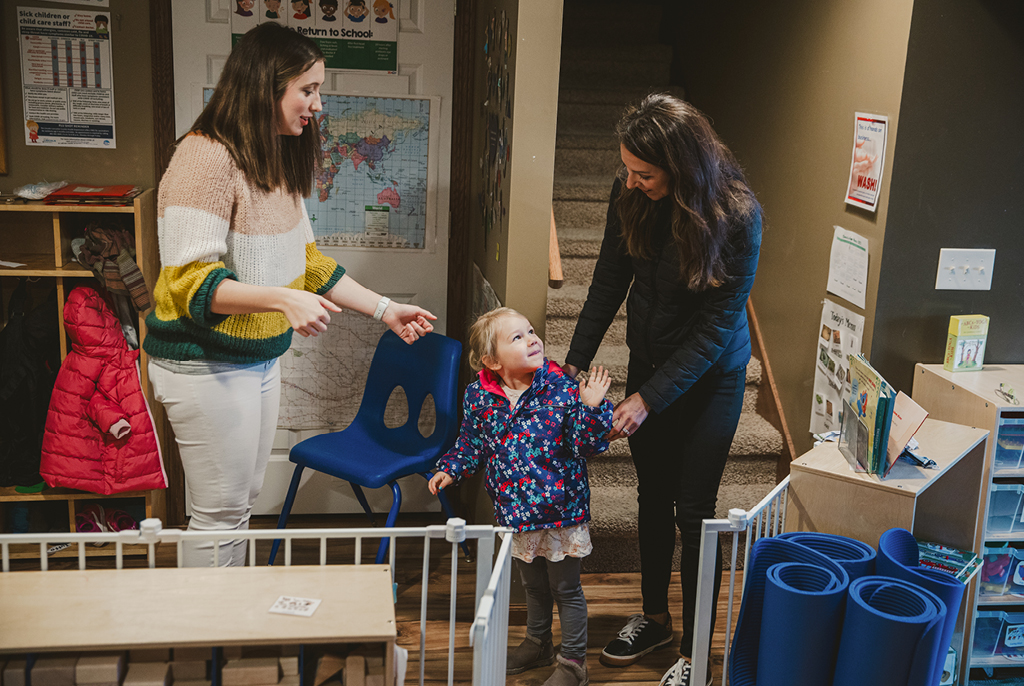
Tips for providers to improve communication with parents
There are many ways to communicate with parents, which you can learn to improve in depth when you enroll in Step Up to Quality, but here are some thought starters.
Are you taking the time to check-in with individual parents about their child’s development? Newsletters, social posts and blog posts are great ways to showcase your center as a whole, but it takes regular one-on-one communication with parents to strengthen their trust in your care and success in their child’s development. Decide what frequency and form of communication works best for you and your children’s parents, like weekly text touchpoints, daily app updates and monthly phone calls.
How are you building positive relationships with parents? Inevitably, challenges will arise when caring for children. If a relationship is established prior to issues, it helps parents and providers face them as partners with a solutions-oriented mindset. Learn more from the nonprofit Zero to Three about ways to examine how you approach problems and communicate them to parents.
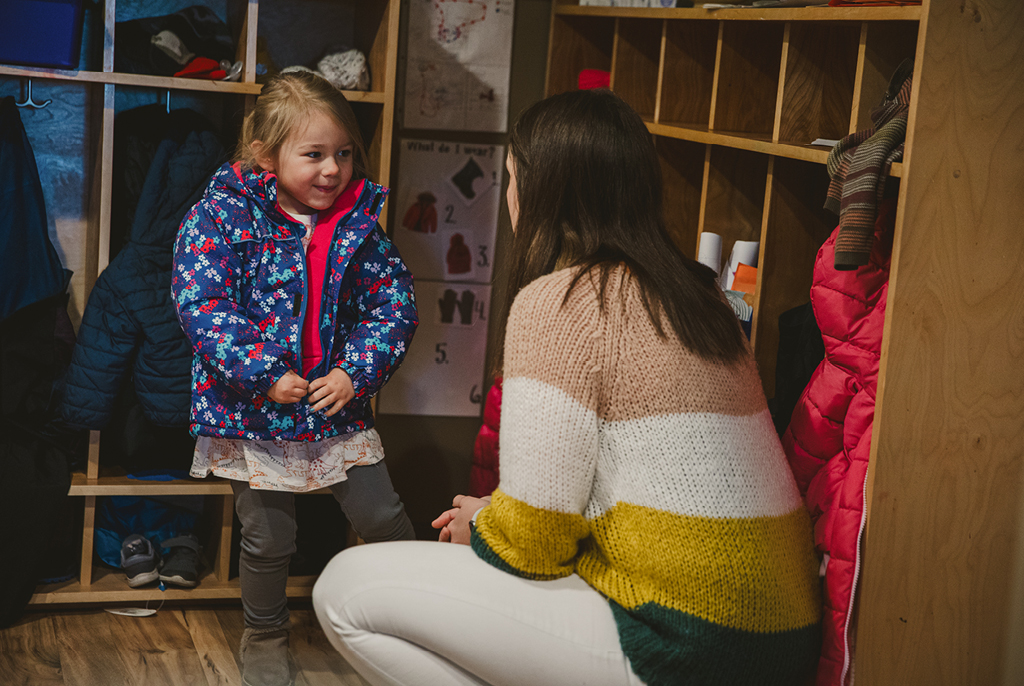
Improve communication practices and more with Step Up to Quality
We’re committed to improving early child care and education in Nebraska. Our coaches are ready to guide you on your journey to higher quality. Learn about the benefits of enrolling.
This is Quality
Every year, and every day, is about quality at Step Up to Quality. But in 2022, we’re going to be emphasizing quality in new ways.
The early childhood education field has been significantly impacted by the pandemic. However, child care providers have shown incredible resilience. People outside of the field now have a greater awareness of how essential child care is and how important high-quality early childhood education is for our youngest Nebraskans.

At the same time, we recognize that “quality” can be hard to define, especially for people like first-time parents. Even for experienced child care providers, new research and data is always being published, and the field itself is continuously improving.
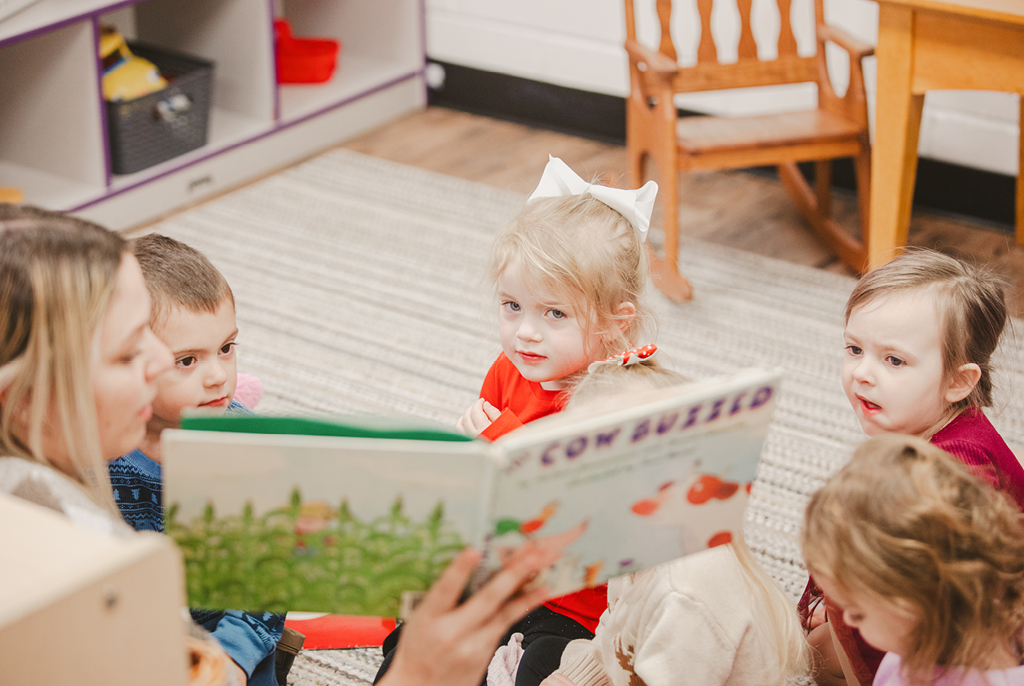
Over the course of this year, we’ll be communicating what quality means to us. We’ll release new ways of connecting with our team, you’ll see the new ways that we’re reaching parents and growing awareness of Step Up to Quality, and you’ll learn of ways we’re improving our own processes. Throughout it all, we’ll be showing gratitude toward all the child care providers and early childhood education teachers who are participating in Step Up to Quality this year. These educators place a high priority on continuously improving the quality of their care, and they go above and beyond for Nebraska’s children every single day.

Above all, we’re here to ensure every child in Nebraska has the very best start in life. High-quality early care can make a tremendous difference in the future of our state, and we’re determined to make sure every child has access to it. Quality matters.
A Big Thank You for Early Childhood Professionals
As Nebraska’s quality rating and improvement system, Step Up to Quality has a mission to support and provide resources to those who are doing essential work in the early childhood education field. These benefits range from personal recommendations for improvement and financial incentives to something just as vital: gratitude and encouragement for our participating programs.
“Thank you doesn’t seem like enough, but I would like to extend a sincere, heartfelt thank you for the hard work of early childhood professionals, their selfless dedication and abundant love that they provide to the children and families they’re caring for,” said Lynne Cook, the coach specialist at Step Up to Quality. “They’re not babysitters. They’re professionals who have the incredible power and responsibility to prepare each child for their future success.”
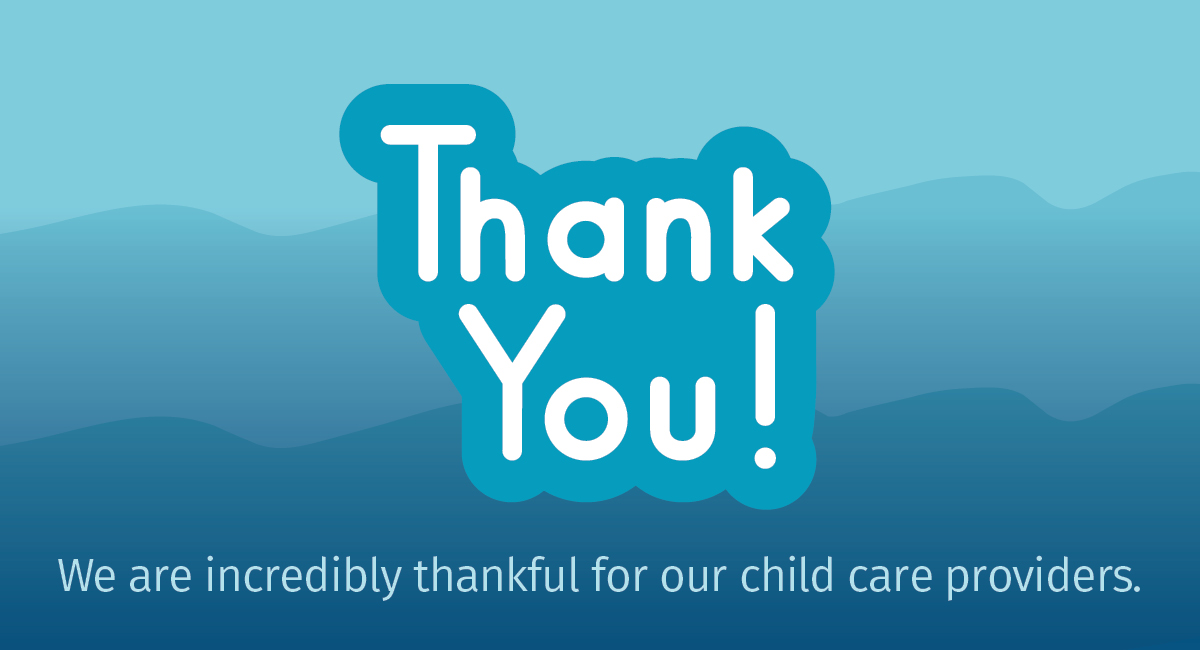
Whether your program has been enrolled in Step Up to Quality for a while, is just starting out or is curious about what we do, we acknowledge and appreciate the hard work you’re doing. You’re building the foundation for people’s lives, which is already an important task, and the pandemic made it even more challenging. In addition to educating children and keeping them safe, their health became a bigger factor than ever. You have the courage to show up and be your best each and every day for your families — and we thank you for that.
Participating in Step Up to Quality is a continual source of encouragement
Gratitude and encouragement are ingrained in our coaching practices, too. Our intention is to be a partner in supporting and elevating programs. Providers have the option to be coached by an early childhood professional, who will guide and support them as they navigate the Step Up to Quality process. Coaches make sure that no one feels overwhelmed or isolated on their journey to even higher quality practices.
Our coaches respect what programs are aiming for, focusing on strengths while bringing to light some areas that may need a little attention or consideration. Our participating programs tell us over and over that this free coaching is one of the biggest benefits.
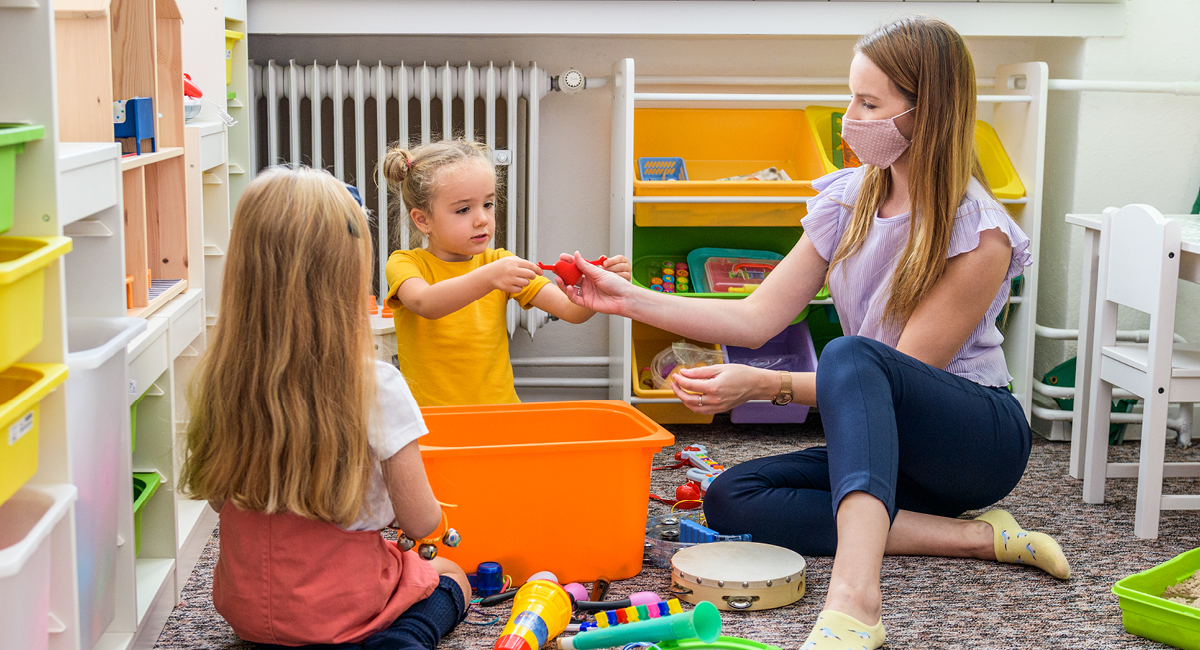
“Providers and teachers are educating the next generation, and we’re here to lift them up and encourage them to be the best they can be because that’s what we all want,” said Lauri Cimino, director of Step Up to Quality. “We want successful children and families, and that in turn will lead to successful communities.”
When programs decide to participate in Step Up to Quality, they’re also showing their families and community that they’re committed to going above and beyond to provide quality care and education for young children. We know this is a commitment that’s at the core of what providers do, and they’re already creating great experiences for children in their care. By being a part of Step Up to Quality, programs are formalizing and publicizing their efforts, and we even help amplify those efforts with our find a provider tool. Each participating program also has its own web page on our site.
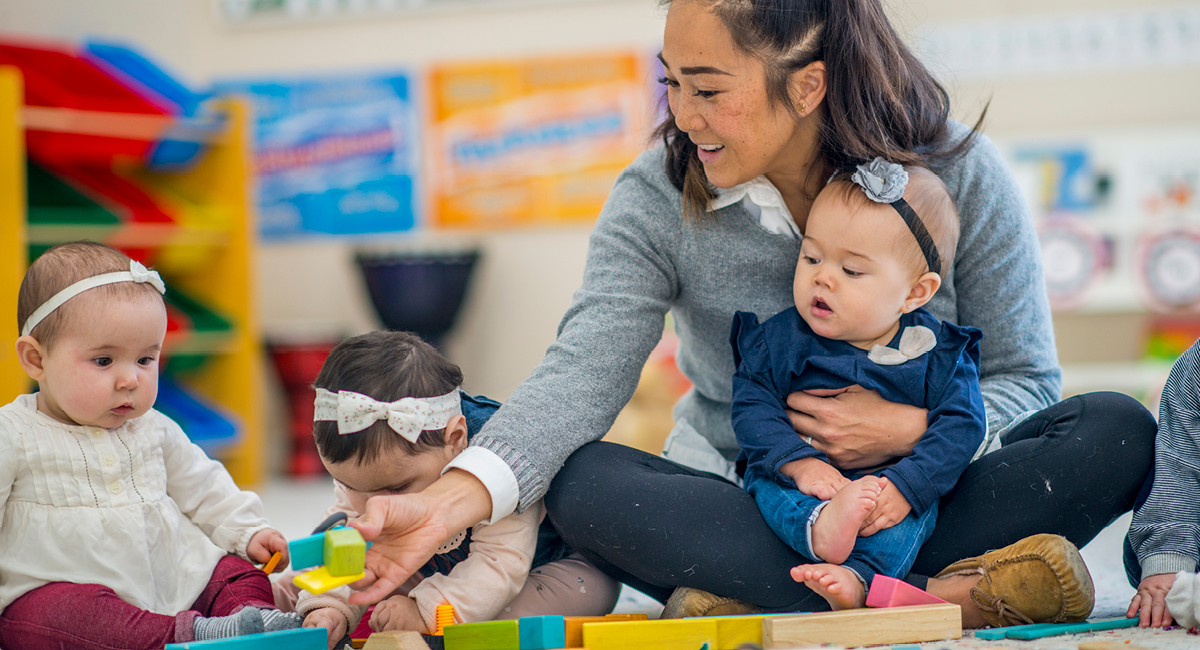
The Step Up to Quality team and participating programs are a supportive network, and we’re here to uplift every early childhood professional, because every role in the lives of children is meaningful. Whether you’re a current participant or are thinking about enrolling, our team would love to help answer any questions you may have.
Tips and Tools for Teaching Children Emotional Skills
Children can experience a wide range of emotions throughout a single day, but they aren’t always able to recognize and understand emotions in themselves and others. That’s why it’s important for children to learn emotional skills in early childhood education settings.
More broad emotions, like happiness and anger, are generally picked up by children on their own. In experiments, researchers have found that 5- to 6-year-old children can identify both happy and angry faces with very high levels of accuracy. At the same time, recognition of sad faces can take years longer, with kids as old as 10 misinterpreting sad facial expressions as fearful ones.
Understanding emotions plays a fundamental role in the development of children’s social competence, which is why Step Up to Quality includes supporting emotional development in our rating of early childhood education providers and offers access to coaching and resources to improve it.
Tools to Practice Emotions
Labeling and talking about emotions is a good place to start in supporting children’s emotional skill development. In one study of emotion identification, researchers gave typically-developing elementary school students training in the identification and self-production of facial cues. After only six, half-hour sessions, children improved their ability to read emotions compared with controls. Children with Autism Spectrum Disorder (ASD) experience a deficit in facial emotion recognition, but practice has shown to improve their ability, too.
As part of our efforts to help early child care providers and educators recognize and improve quality, Step Up to Quality has developed our own set of emotion identification cards that you can download, print and utilize for free in the classroom or at home. There are two deck versions available: one with illustrated faces and one with blank faces. The blank faces deck presents the opportunity for children to draw in emotions as part of an activity.
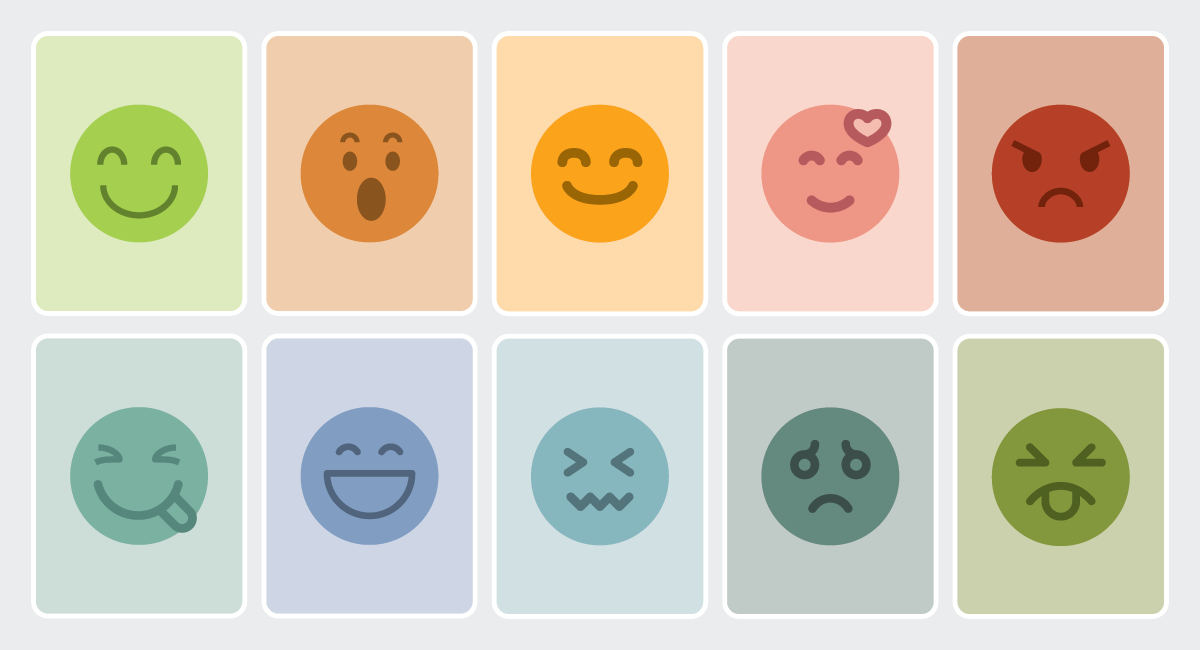
Download the Card Decks
Illustrated Card Deck | Blank Card Deck | Printable Instructions
How to Use Emotion Identification Cards
While social skills develop all throughout life, they grow most rapidly between the ages of 0 and 5. These cards can start being incorporated into curriculum for children as young as 18 months. Here are a few activity recommendations for engaging different age groups.
For children ages 18 months to 3 years:
- Hold the stack of cards face down and flip them over one at a time to name each emotion.
- Show children a card at random, ask them to act out the face pictured, then name the emotion together.
- Place multiple cards on a table. Name one of the emotions showing and ask children to identify which face you described.

For children ages 4 to 5 years:
- Hold the cards fanned out and ask children to pick them one by one until they find the emotion that they are feeling at the moment.
- Have children choose a card and talk about a time when they felt that way. What happened, and what was it like?
- Choose a card, name the emotion and discuss what you could do if someone around you was feeling this way.
- Print off the deck with blank faces for the children. Walk through the cards individually, talking about what each emotion looks like and what situations may cause it to be felt. Then let the children draw in the face of that emotion after each card is discussed.
Have other ideas for emotion identification games? Share it with the Step Up to Quality team, and we may feature your classroom on our social media!
How to Advance Early Childhood Education with Local, Fresh Foods
In quality early childhood education, food is an important component—from what children consume at snack time to learning about how it’s produced. Healthy eating habits start as early as infancy.
Our colleagues at the Farm to Preschool program, an initiative through the Nebraska Department of Education, work to connect early care and education settings to local food producers with the objectives of serving locally grown, healthy foods to young children, improving child nutrition and providing related educational opportunities.
We recently connected with Deb Buck, a family engagement supervisor and outreach coordinator at Educare, a provider that’s a part of Step Up to Quality in Lincoln, Nebraska, to learn more about how they’re incorporating gardening and produce into their curriculum.
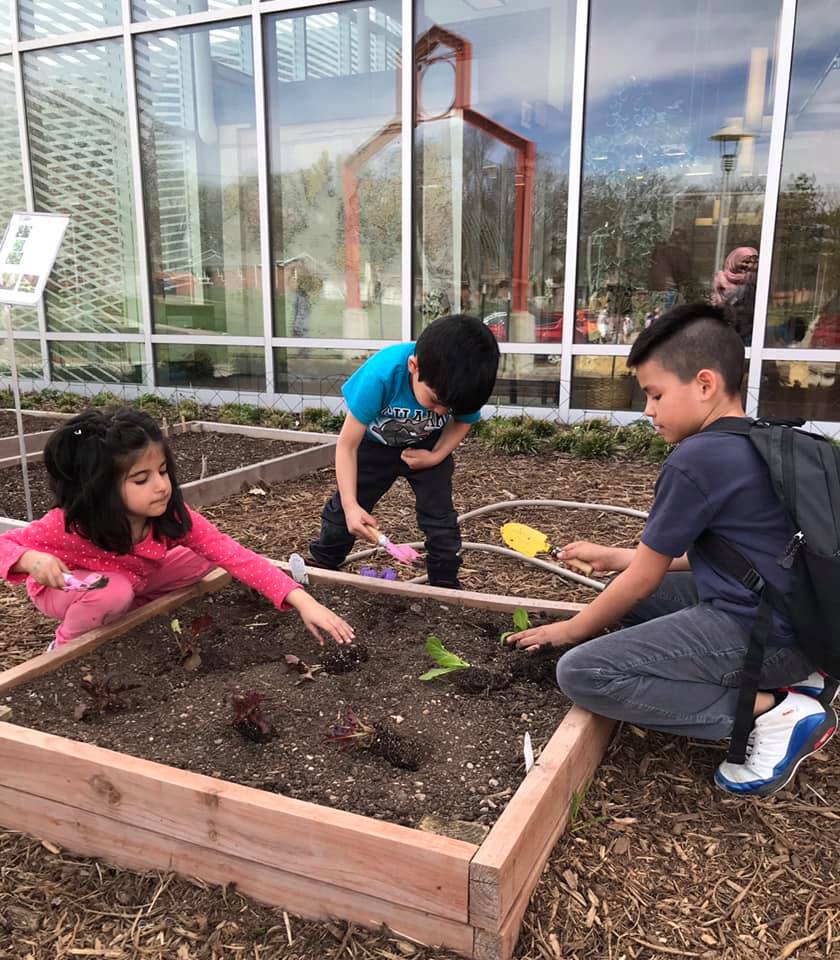
How long has your center participated in this initiative?
We began in 2017, but I’ve been involved in Farm to Preschool for more than 30 years. Once I started working at Educare, I did some research and reached out to Community Crops, who at the time had a Farm to School program, to establish a garden. Our Family Engagement team really spearheaded this program.
Involvement in the initiative can span from casual to immersive. What all does Educare do?
When the Community Crops program ended, we sought a new collaboration with Nebraska Extension and Partnership for a Healthy Lincoln. Through them, we got three master gardeners that supported us in setting up the garden, coming multiple times over the first few weeks, then coming out once a week to work with our teachers.
We’ve also connected with the local Food Bank to send a box of produce to our families once a week for 12 weeks. Once that was established, we went back to Nebraska Extension and connected those partnerships to send along recipes with the produce boxes for parents to try out.
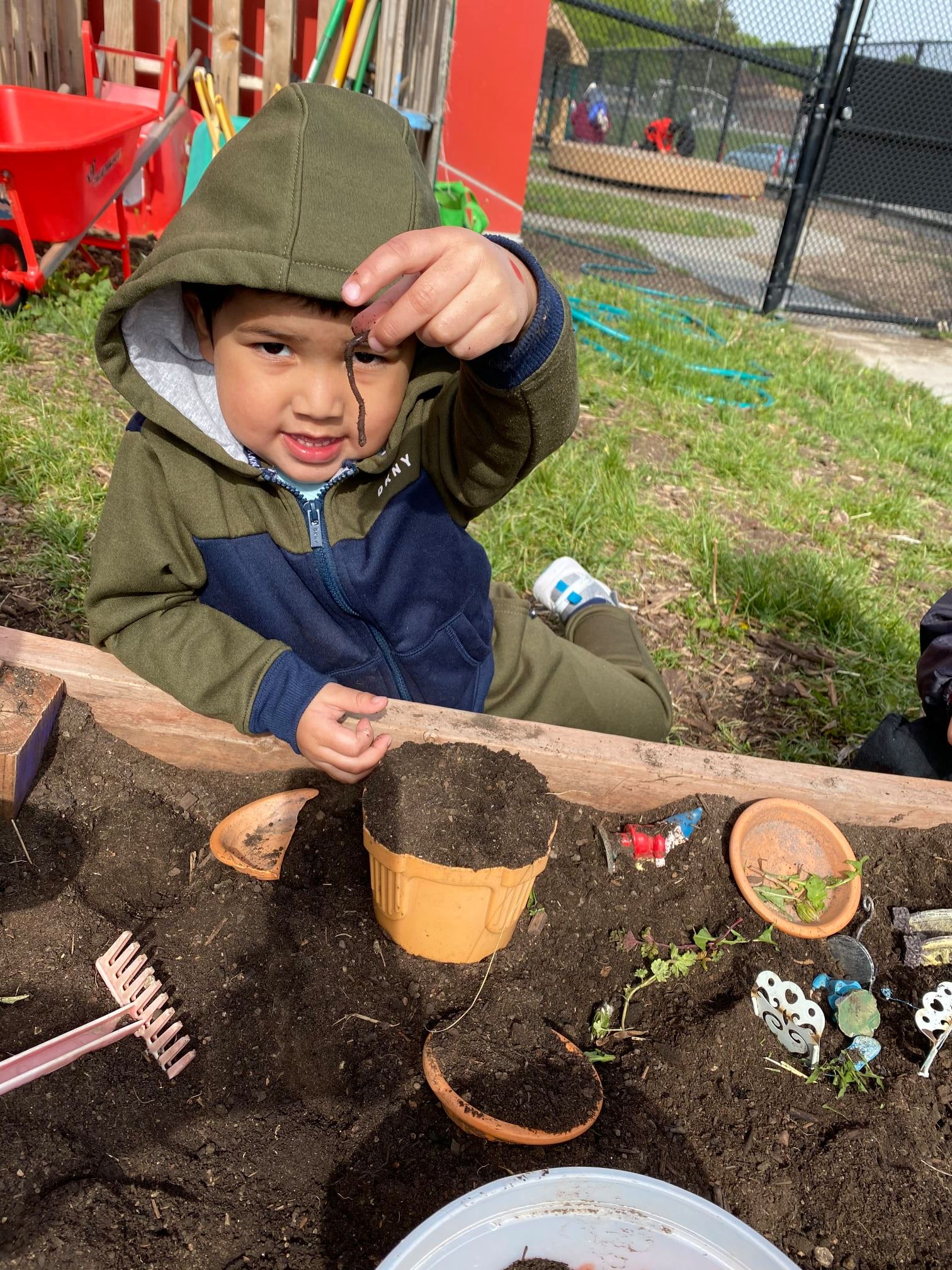
Why do you think this initiative is important, and what positive impacts have you seen?
It’s important for children to know where produce comes from and have that understanding. Also, a lot of our teachers will take children out to the garden if the child is having an off day. It’s practical, intentional work where children can care for something.
The children have really diversified what they’ll eat, too. We can grow kale and make chips or salad, which is not something they always get at home.
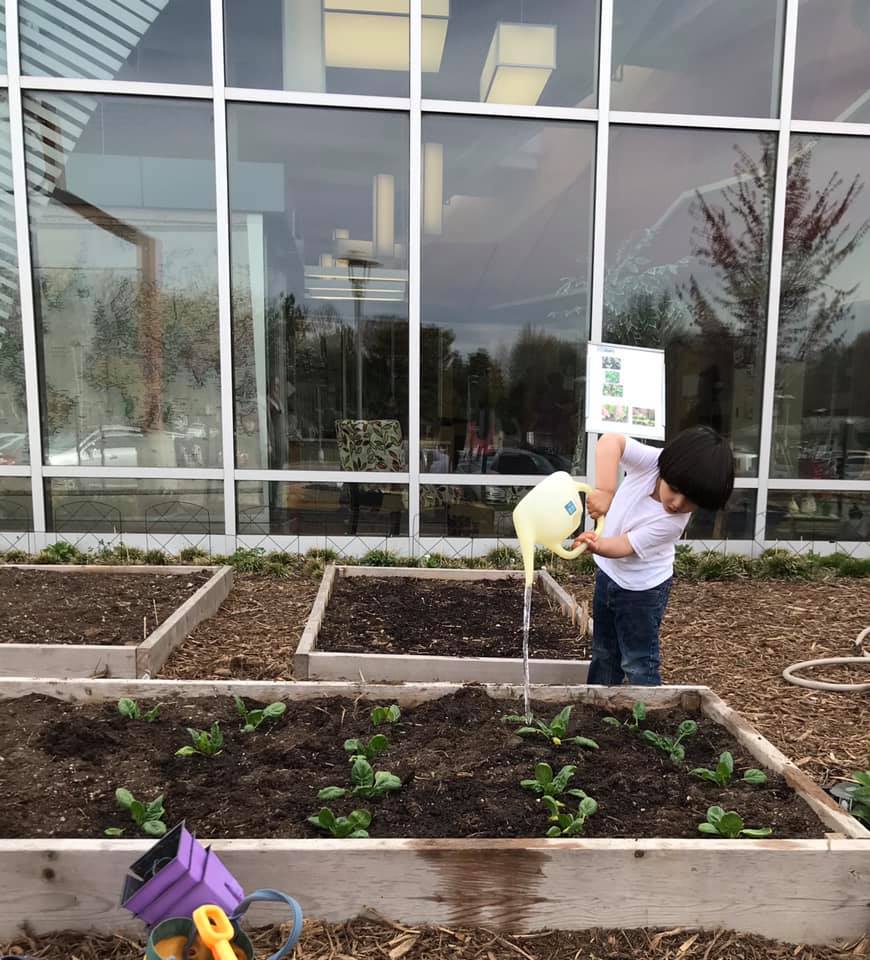
How does this program boost the quality of the care you provide?
In my view of quality early childhood education, children can’t learn everything in life in just a classroom. You can have a cartoon picture of a fruit, but it’s so much richer to be able to see, feel and taste it in the garden. They see the lifecycle of plants and learn how to nurture them.
Parents have had a really positive reaction to our efforts, and I do think it sets us apart from other centers. We had a spring garden workday, and one mom in particular who did not have access to personal transportation made sure her neighbor could get her and her child there to participate.
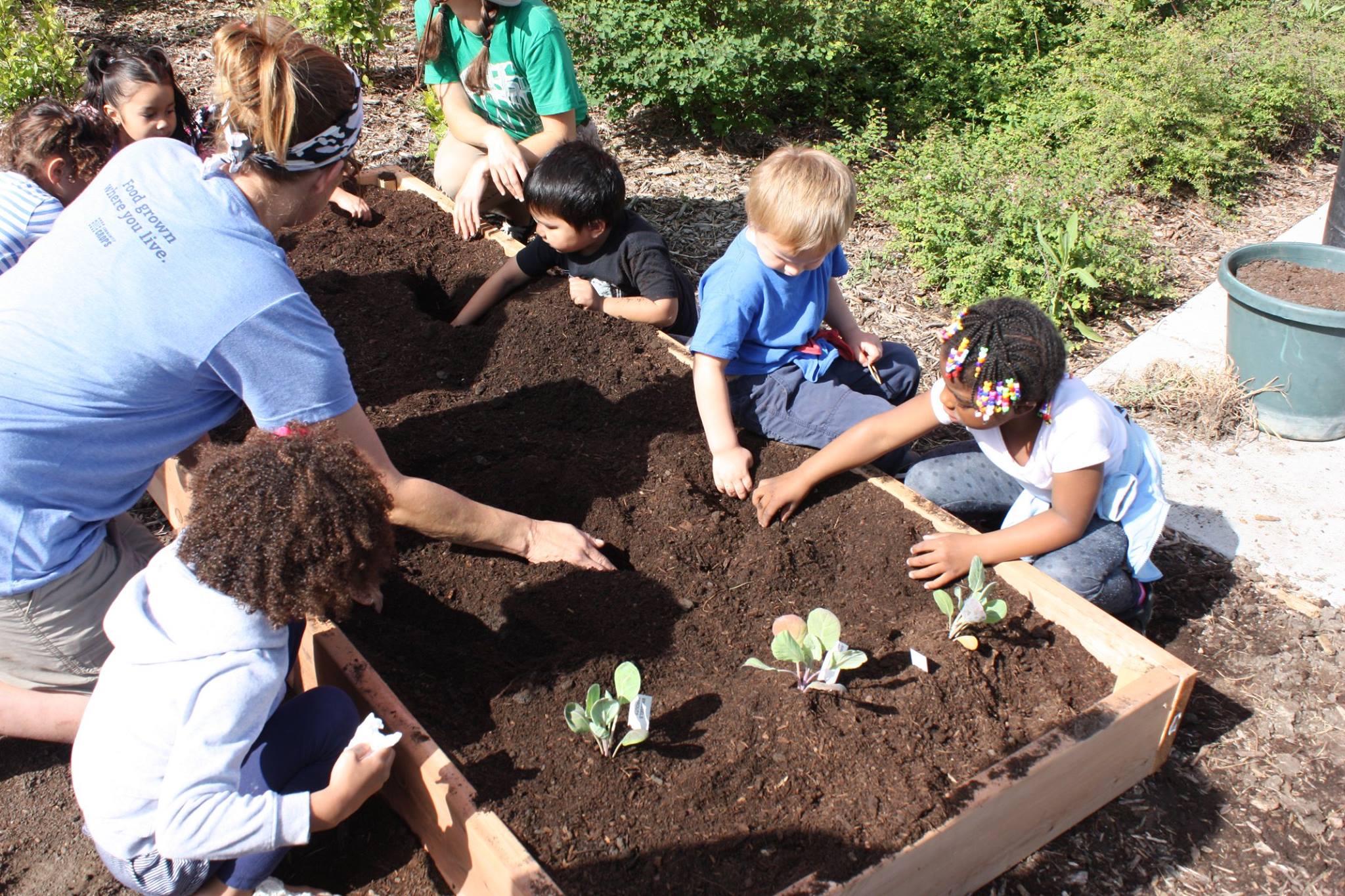
What would you say to other providers who are considering joining this program?
Do it! Don’t be afraid to fail. Start with potted herbs in your classroom for children to smell, touch and taste. There are all different ways to connect children to plants.
If you can, have children prepare a snack as a part of your program. Get fresh produce from a farmers market for them to wash and prepare. It makes them feel like they’re giving back to their classroom. There are easy ways to put produce in the hands of children without having a garden, but do try a garden, too!
The most important thing is getting in touch with plant care and fresh veggies and fruits.
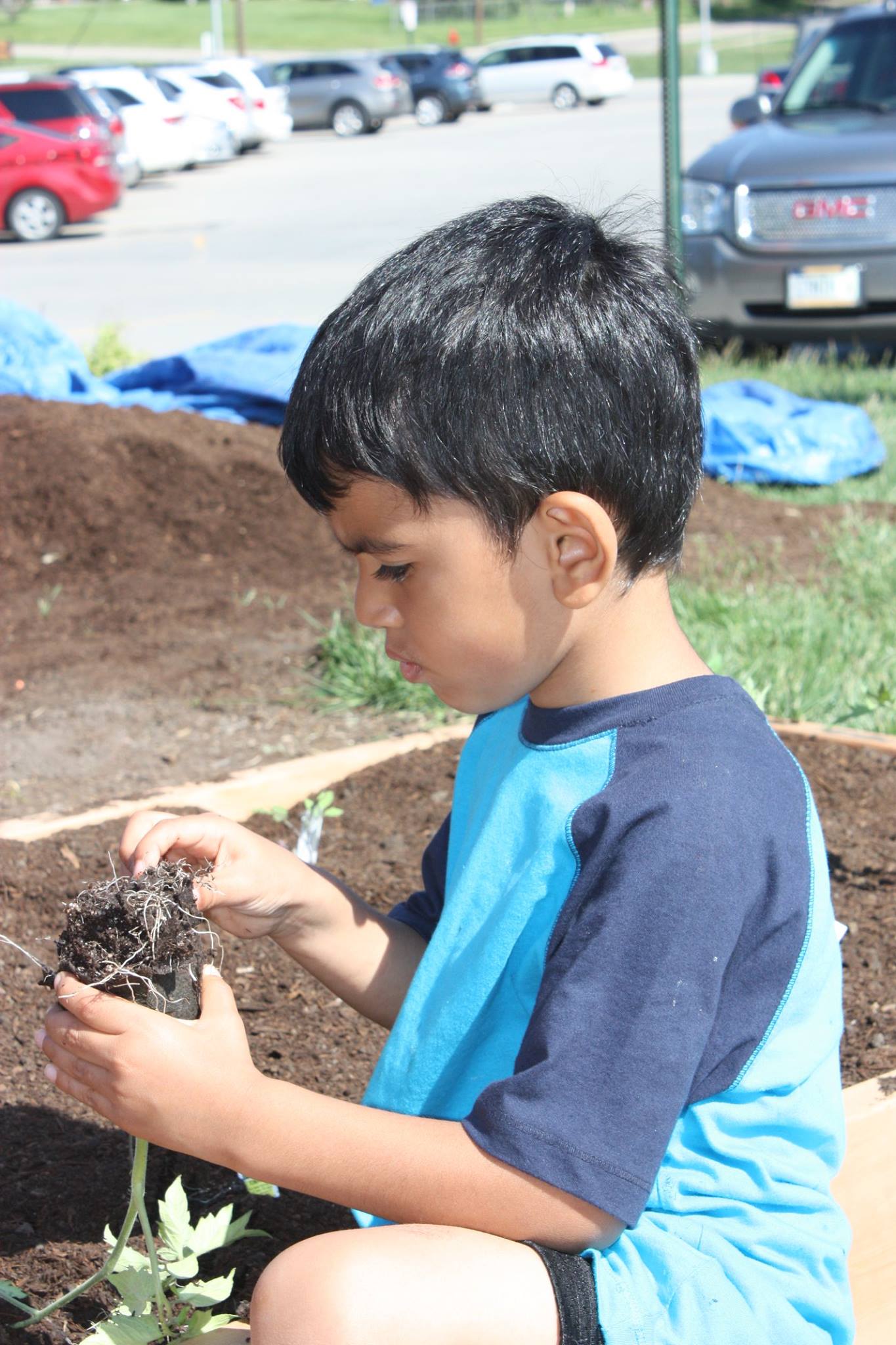
What value do you see in being a part of Step Up To Quality?
I think that if we’re going to create a profession that supports professionals within it, we need to have an overarching program like this. It’s a measurable program that empowers providers to show they’re serious about quality care, and reaching certain steps can unlock even more employee benefits.
Ready to plan how your center can get involved with the Farm to Preschool program? Check out more recommendations for how to get started.
And if you haven’t enrolled in Step Up to Quality, we’d love to have you on board. We serve all child care and early childhood education programs throughout Nebraska with support and resources that continuously improve the quality of care provided. Learn more about our program benefits.
A Child Care Safety Checklist for Parents and Providers
If you’re reading this, odds are you care deeply about the safety of children as they learn, play and grow. Safety is also important to us at Step Up to Quality.
When it comes to creating a child-safe environment in early childhood education settings, some hazards are difficult to recognize until it’s too late. That’s why our team has put together a checklist for parents and providers, as a starting point for keeping children safe. There are undoubtably other safety considerations to make, depending on specific circumstances, environments, ages and other factors — this is not an exhaustive list.
This checklist is an overview for judging if a child care center or family child care home is meeting safety standards. If you’re a parent, use this checklist to analyze a potential child care provider. If you’re a provider, use these questions as a checklist to review your own classrooms and consider ways hazards can be avoided.
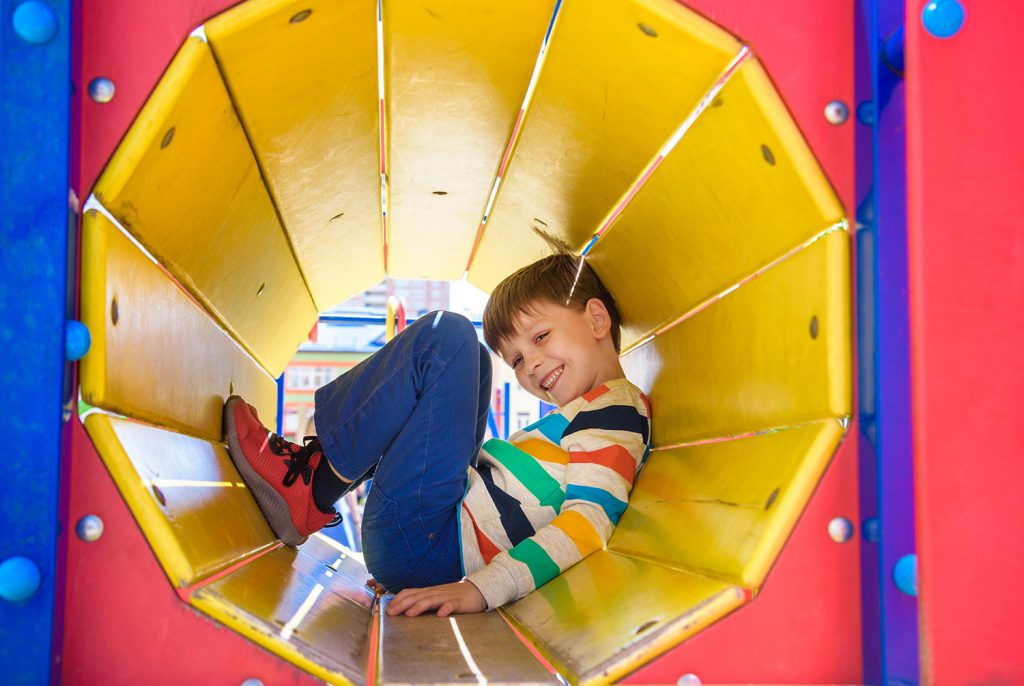
Play Safety
- Are play areas clean and in good condition?
- Are younger and older children securely separated during play?
- Does the playground equipment have any protruding nuts or bolts? After periods of time, these can start to loosen.
- Does the outdoor play area have a soft ground?
- Are area rugs secured with rubber or tape to avoid slip hazards?
- Are there blind spot areas in large rooms where a child may not be watched over carefully?
- Are long, straight walking paths broken up so children aren’t tempted to run?
- Is free-standing furniture or equipment robust enough for children to pull themselves up on it? Even larger children’s toys, like play kitchens, can fall on a child and hurt them if they climb on it.
- Are toys an appropriate size for the age group using them? If toys can fit in an empty tissue tube, it can be a choking hazard for infants or toddlers.

Social Safety
- Are children’s group sizes manageable for the amount of people on staff at any given time? Caregiver-to-child ratios should be at least 1:4 for infants and young toddlers, 1:6 for older toddlers and 1:10 for preschool-aged kids to decrease the likelihood of injuries or illness.
- Are care and discipline policies transparent? If these are vague, or not officially stated at all, it can indicate a careless environment.
- Have there been instances of physical conflict between children? How were these resolved? What plans are in place to avoid them in the future?
- How are people allowed in the child care center/family child care home? Are there security measures in place to deter strangers from coming into contact with the children?
- Has everyone in contact with children had a background check and criminal screening in accordance with Nebraska law?
- What precautions are in place to keep kids safe from abuse?

Health Safety
- Are safeguards in place to prevent accidental cross-contamination for children with allergy concerns?
- How is food stored and labeled to ensure it’s kept fresh and received by the correct child?
- Is staff trained in proper medication storage, handling and administration?
- Are staff and children up to date on their immunizations?
- Are cabinets locked, especially if they contain choking hazards, cleaning supplies or sharp objects?
- Are facilities, toys and equipment washed and disinfected daily?
- Are emergency plans for fires, extreme weather or other hazards updated and practiced regularly? When was a drill last practiced?
Your child, or your child care provider, may have unique safety needs that fall outside of this checklist. We encourage you to use this as a starting point, not a final checklist, in analyzing and improving children’s environments.
Meet the Step Up to Quality Team: Lauri Cimino
The Step Up to Quality team is an incredible resource for child care providers going through any of the five Steps — and they can also connect providers with other early childhood education resources. As a part of the State of Nebraska Department of Education’s Office of Early Childhood, the Step Up to Quality team works closely with its colleagues within the government and with partner agencies across the state.
To help providers get to know the people behind Step Up to Quality better, we’re featuring each of the team members and their role. Now that we’ve featured the whole team, it’s time we highlight Step Up to Quality’s Director, Lauri Cimino!
Collaborative Leadership
Lauri has been a part of Step Up to Quality since the launch of the program. She built a team of professionals with a variety of experiences, including many early childhood education specialties. Most of her team has been with Step Up to Quality since nearly the beginning, including back when the State of Nebraska conducted research on Quality Rating and Improvement Systems (QRIS) from across the nation. Lauri leads with an inclusive and collaborative style – she and her team continue to help shape Step Up to Quality’s processes and structure.
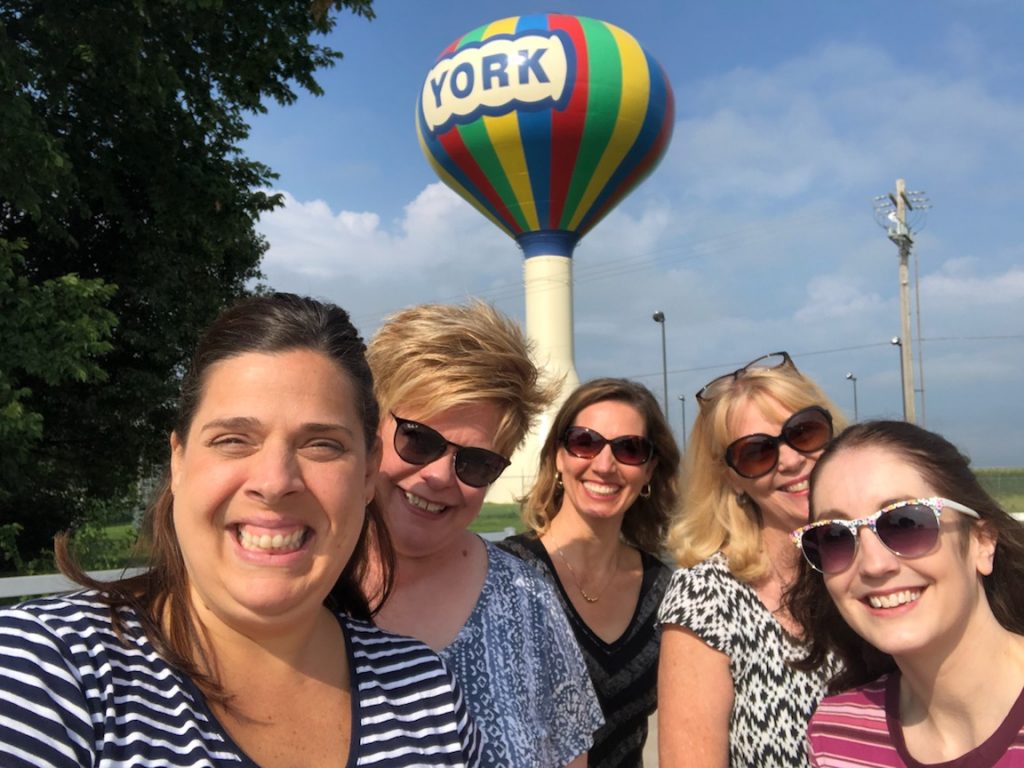
She joined the Step Up to Quality endeavor because she’s seen the difference high-quality early childhood education makes from nearly every perspective: a mother, grandmother, teacher and child care center director and administrator. And now, for the seven years Step Up to Quality has been in existence in Nebraska, she’s seen the impact on a state-wide level.
“We are very close to celebrating the 600th provider who is participating in Step Up to Quality, a truly impressive achievement that will belong to everyone,” Lauri said.
Lauri’s team works with colleagues at the Department of Early Childhood, and with others in the overall Departments of Education and Health and Human Services, to ensure Step Up to Quality operates seamlessly within the State of Nebraska’s systems. And the team often collaborates with other state-wide initiatives and regional programs to ensure early childhood educators are given the best tools and resources possible to provide the highest quality care for Nebraska’s children.
“Step Up to Quality is part of a big movement to not only raise awareness about the importance of high-quality early childhood education in our state, but also give providers a pathway to continuously improve the quality of their care,” Lauri said.
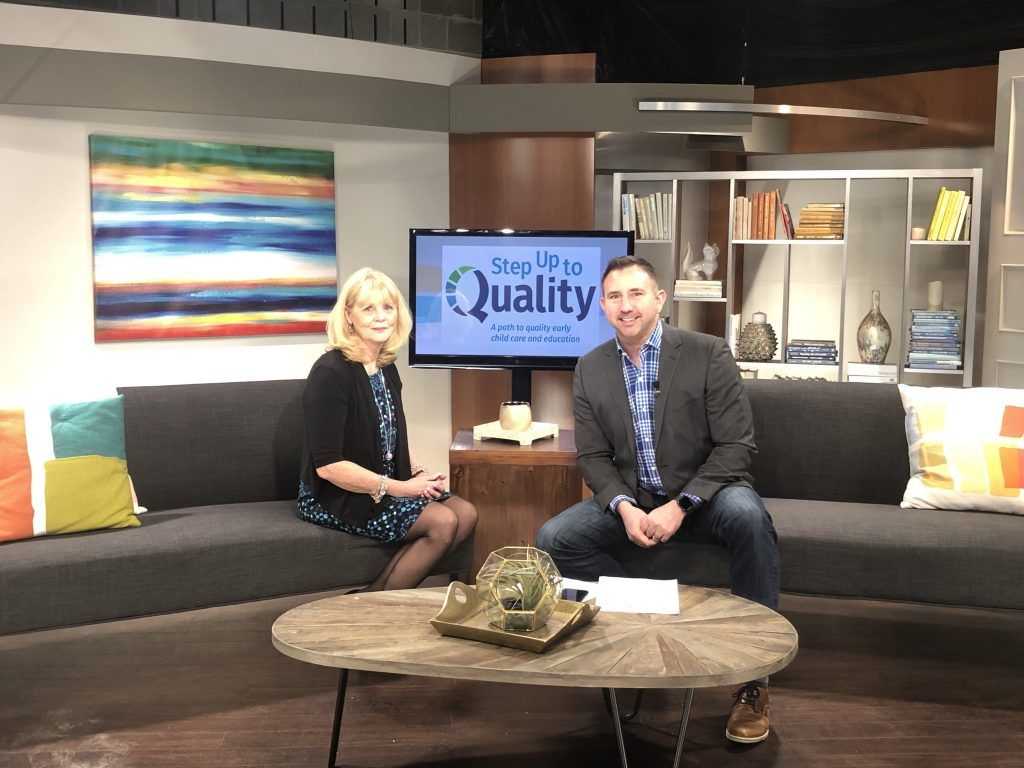
Proving the Point
Lauri started her career in early childhood education as a teacher and special educator. She’s seen firsthand that high-quality child care sets the stage for a person’s life, from the children she taught to the experiences her own children had.
“Choosing a child care provider is one of the most important decisions parents will make,” she said.
Over the years, Lauri moved her way up to being a child care center director and then a regional manager for a national child care company, but she also has a soft spot for family child care homes, having done that work herself when her children were small.
“My daughter’s children have all gone to the same family child care provider, and she has become like family to us all,” Lauri said.
To Lauri and her team, every child matters. Every child deserves the best care possible.
“I’m so proud that since 2014, more than 33,000 children have been cared for by providers participating in Step Up to Quality. Our entire state benefits by giving children the best start in life,” she said.
The first several years of a person’s life are the most formative in terms of brain development. By providing young children with an optimum environment to grow and learn, research has proven that they’ll be more prepared for elementary school and have better emotional intelligence, among many other benefits.
Looking to the Future
After Step Up to Quality’s fifth anniversary, the team began to analyze their processes and requirements. They conducted thorough research including surveys, meetings with stakeholders and conversations with providers. Over the last two years, the team has been preparing to evolve the program in some strategic ways, based on all the feedback and industry best practices.
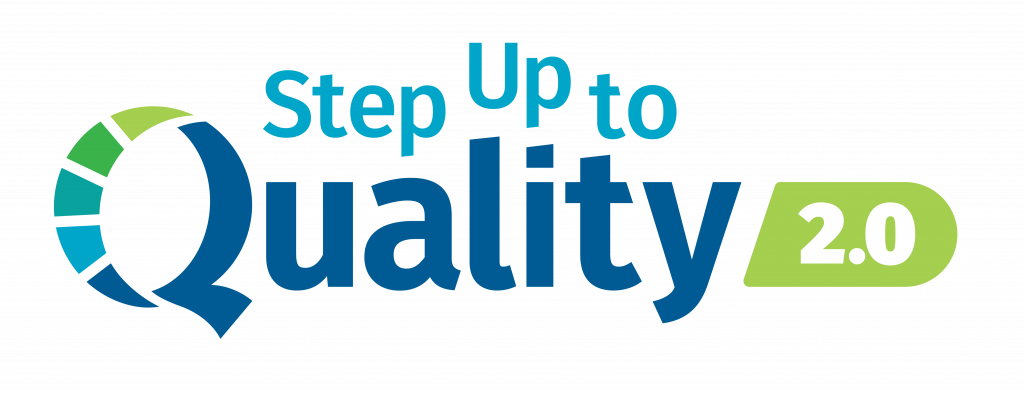
“Our guiding principle is ‘continuous quality improvement,’ and that applies to us as a team, too. We want to ensure Step Up to Quality is the best it can be for the providers who participate,” Lauri said.
Another factor impacting Step Up to Quality and child care providers continues to be the pandemic. More people than ever before are recognizing the importance of high-quality child care as a necessity, not a luxury.
“This has been a tough time for child care providers. It’s the most difficult set of circumstances that I’ve seen in my career,” she said. “We want them to know that we are here for them, and we support them as they continue to go above and beyond for the children in their care.”
The Search Engine That Could
We are thrilled to launch new features on our website — a comprehensive, seamless, user-friendly search function and insightful resources for parents looking for high quality early childhood education.
This search engine is deceptively powerful. Parents can easily narrow down their child care search by inputting a few preferences and quickly see the Step Up to Quality-rated providers that fit their needs.
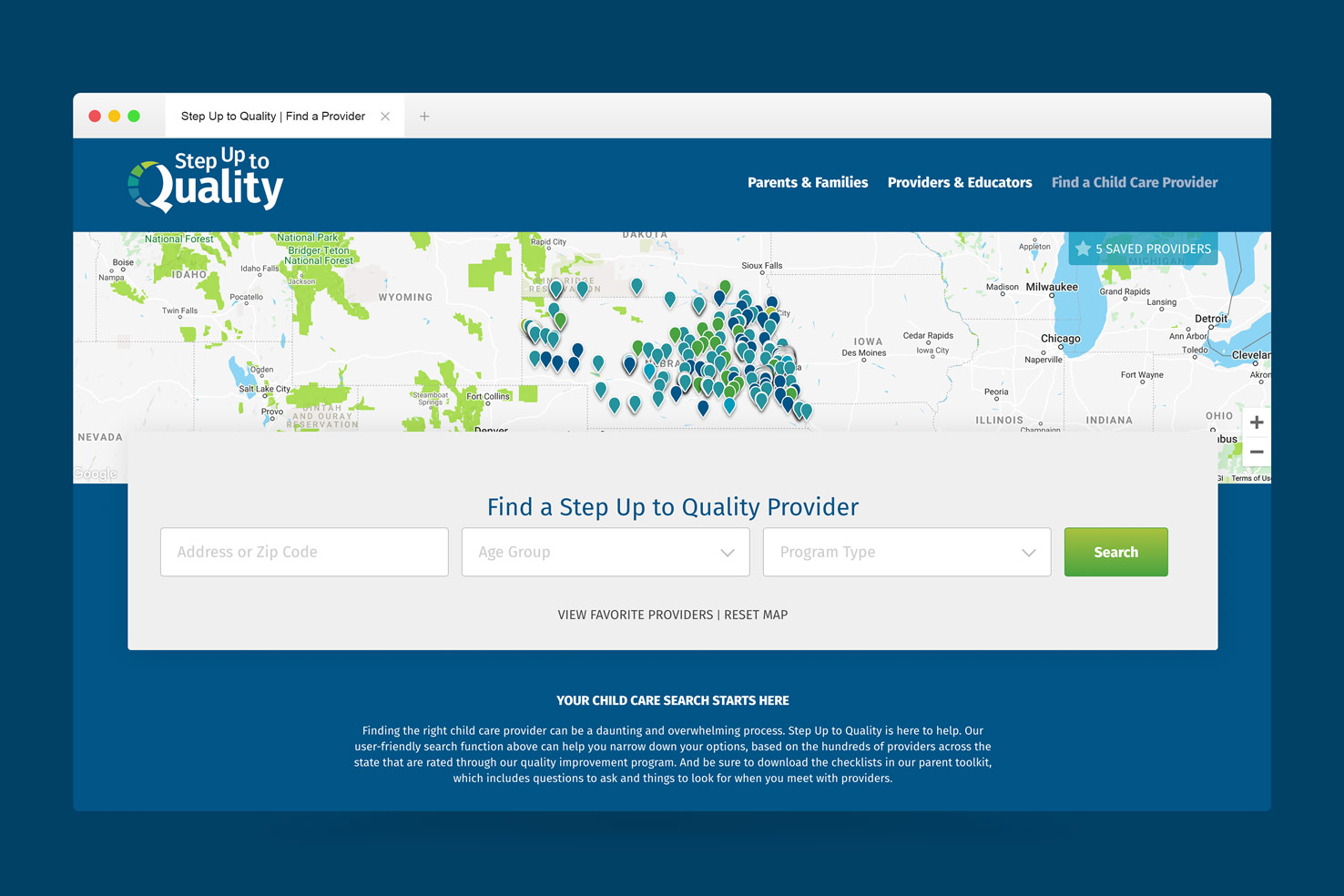
Try it out! You’ll see that you can star your favorites, and the site will remember these favorite providers the next time you visit. You can add or delete providers from your favorites list as much as you need to with the star button.
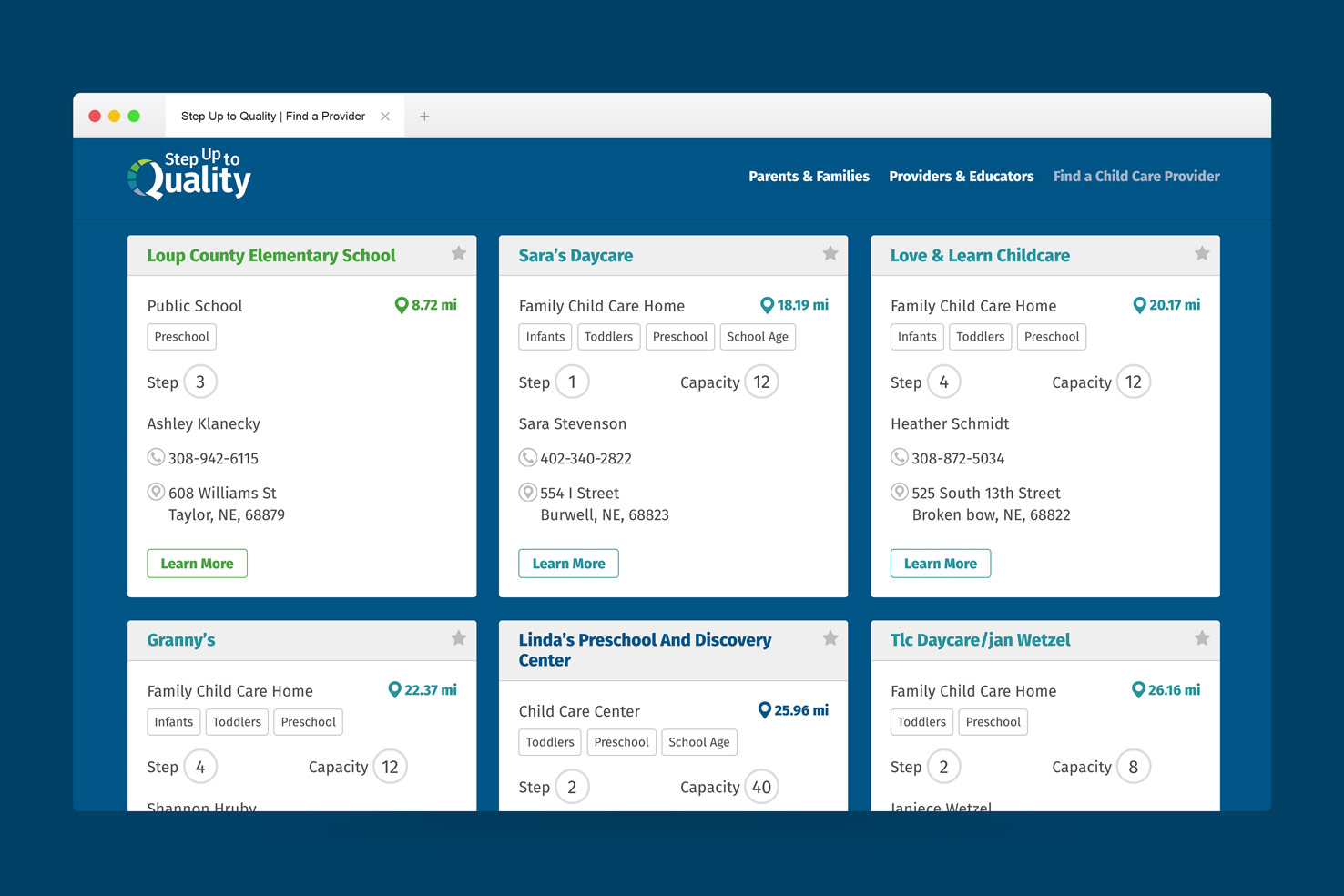
It gets better.
Each Step Up to Quality-rated provider has their own web page now! The page lists accreditations and other helpful details for parents.
On these individual web pages, or even on our resources page, parents can access child age-specific checklists to help them during facility visits or throughout their child care search journey.

Providing these free resources to parents – and connecting them to quality child care providers – is something that is important to us. We want to support both parents and providers in helping care for Nebraska’s children in the best ways possible.
This is the search engine that could change lives!
500+ Providers Strong
We achieved a big milestone: more than 500 providers are now participating in Step Up to Quality!
“This achievement means that thousands of children in Nebraska are receiving the best possible care in their most formative years,” said Step Up to Quality Director Lauri Cimino.
We want to take a moment and thank all the providers across the state who made this possible. Through your hard work, dedication and commitment to the children in your care, you’re making one of the biggest differences in lives you could possibly make. We’re not exaggerating when we say you’re setting the children in your care on a path to living their best lives. You’re making your communities better places to live, and you’re impacting the future of our state.

It’s a big deal, and it all starts with you.
Think about the thousands of children in our state who are receiving attentive care in a thoughtful environment that promotes learning through physical, social and emotional development. The first five years are the most formative of a person’s life, and these children – your children – are in the best possible place where they can build a strong foundation.
Providers, because of all your hard work and the extra effort you put forth, in five years when the babies in your care are entering kindergarten, they’ll be ready to learn. In another 13 years when they graduate from high school, they’ll be prepared for the next step. And in another few years, they’ll be giving back to their communities like you. Our state’s workforce, economy and future are in your capable hands – and we’re so grateful for your commitment to be the best you can be.

No matter where you are along the Step Up to Quality path, we want to give you all the high fives. You’re going the extra mile for your children every day, and it matters.
We’re celebrating you all month long and into February, too. Look out for special posts on Facebook, Twitter, Instagram and Pinterest, and some special images you can share on your own channels, too.
We know this past year has been incredibly hard, so let’s celebrate all you’ve done. Your job is important, you are important, and we’re so glad you are here!
Meet the Step Up to Quality Team: Ann Adams
The Step Up to Quality team is an incredible resource for child care providers going through any of the five Steps – and they can also connect providers with other early childhood education resources. As a part of the State of Nebraska Department of Education’s Office of Early Childhood, the Step Up to Quality team works closely with their colleagues within the government and with partner agencies across the state.
To help providers get to know the people behind Step Up to Quality better, we’re featuring each of the team members and their role. This time we’re featuring Program Associate Ann Adams!
Consistent Communication
Step Up to Quality and Ann Adams have grown together – the day before the program launched back in 2014 was Ann’s first day on the team.
Ann started as the Program Coordinator, the role that Morgan Krull now has. On Ann’s second day, she started taking phone calls from interested child care providers across the state.
“I quickly realized they naturally had a lot of questions and we needed to develop more communication to them, and that communication would be the key to the success of the program,” she said.
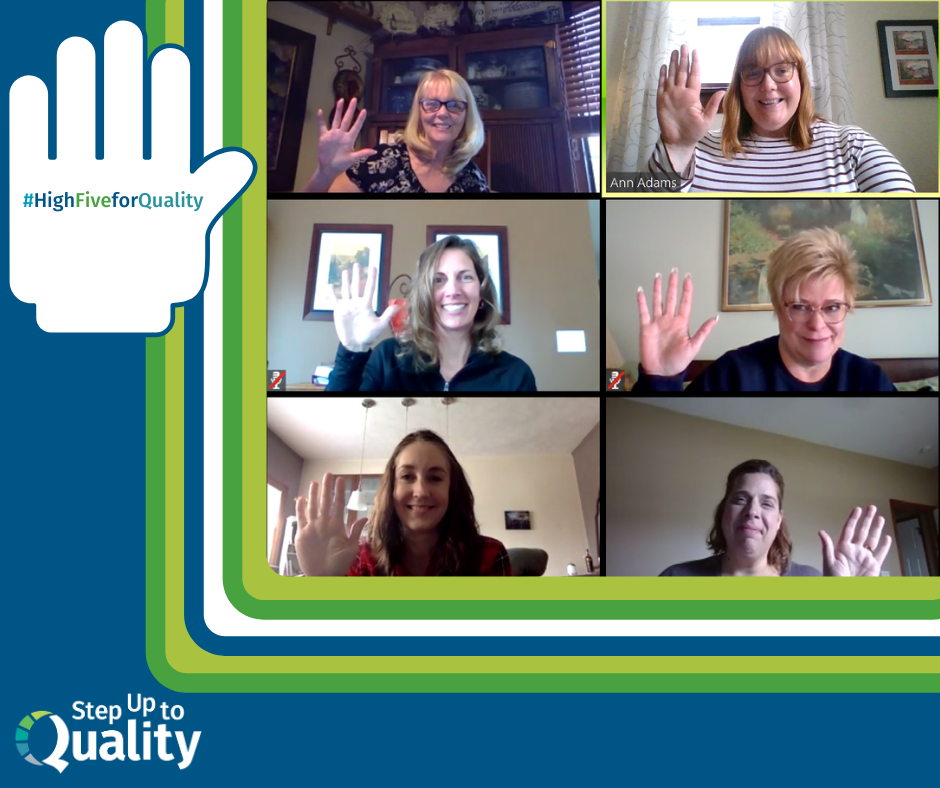
She began to fill in the communication gaps based on her conversations with providers, and six years later she’s the voice of Step Up to Quality on social media. When you comment on a Step Up to Quality Facebook post, heart a tweet on Twitter, share an Instagram story, pin a Pinterest image or use #StepUpToQualityNE on any channel, Ann is the one who sees it behind the scenes. She’s the brains behind those interactions and the creative content.
She’s expanded her role to include the Office of Early Childhood and other departmental programs on social media, too. She divides her time between teams and serves as a communications liaison between programs, which is especially valuable during the pandemic when nearly everyone on those teams are working from home.
Creative Curiosity
Ann came to Step Up to Quality after working in a busy hospital office.
“I never got the chance to be creative there,” she said. “I really appreciate that about the Office of Early Childhood.”
While she didn’t have a background in early childhood education, she used her perspective as a newcomer to her advantage. She was easily able to put herself in the shoes of an outsider, and then communicate accordingly so anyone could understand. In addition, she relied on the experts surrounding her.
“I knew I could be confident in the handoff if someone had a specific question about the process,” Ann said. “Everyone on the Step Up to Quality team cares so much about getting everything right and treating everyone with respect.”
She believes in the idea that the Step Up to Quality team mirrors the people they serve in early childhood education.
“High quality early childhood education is important because that’s where our creativity and curiosity are first nurtured,” she said. “And that stays with a person for the rest of their life.”
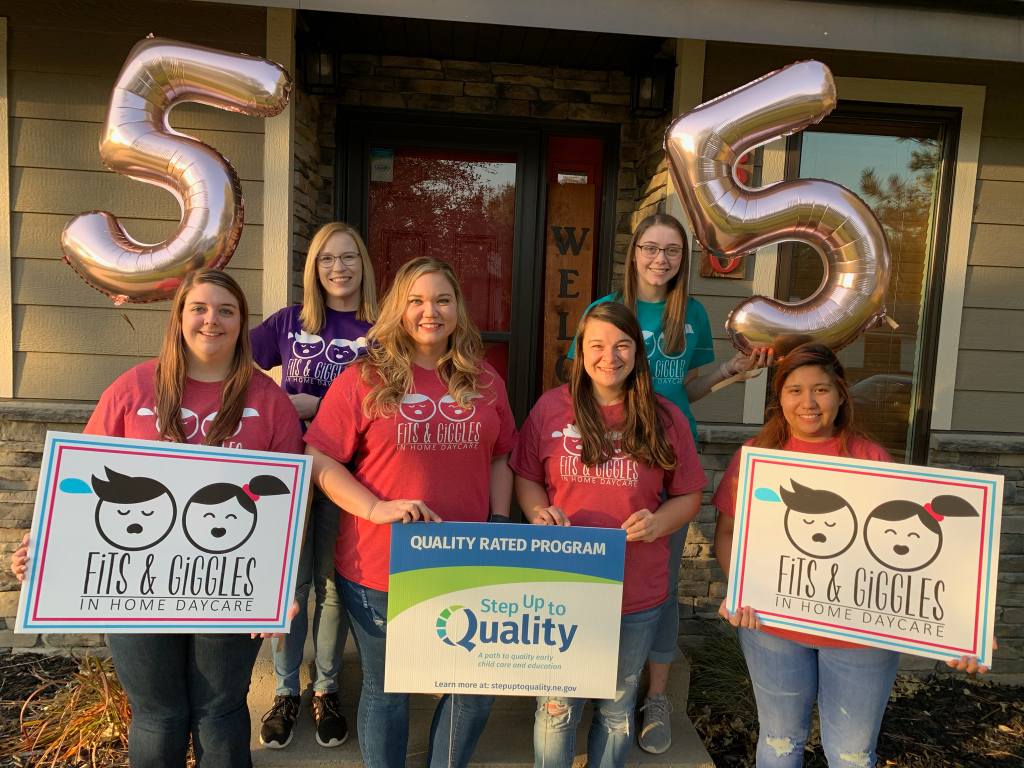
Ann remembers the first child care where she and her brother attended – Sunshine Daycare in Syracuse, Neb. In fact, she ran into one of her teachers in Lincoln a few years ago – and it was her teacher that recognized her.
“I couldn’t believe she knew who I was 30-some years later,” Ann said. “It just shows you how much these early childhood teachers care about their kids.”
Celebrated Comments
Ann appreciates being able to tell the great stories, and statistics, research and program information, that encompass all aspects of Step Up to Quality on social media. And, she wants to empower providers to do the same.
“We encourage providers to use their participation in Step Up to Quality as a marketing tool for their program. It’s a big deal that they’re working to continually improve the quality of their care, and that they’re going above and beyond for their kids,” she said.
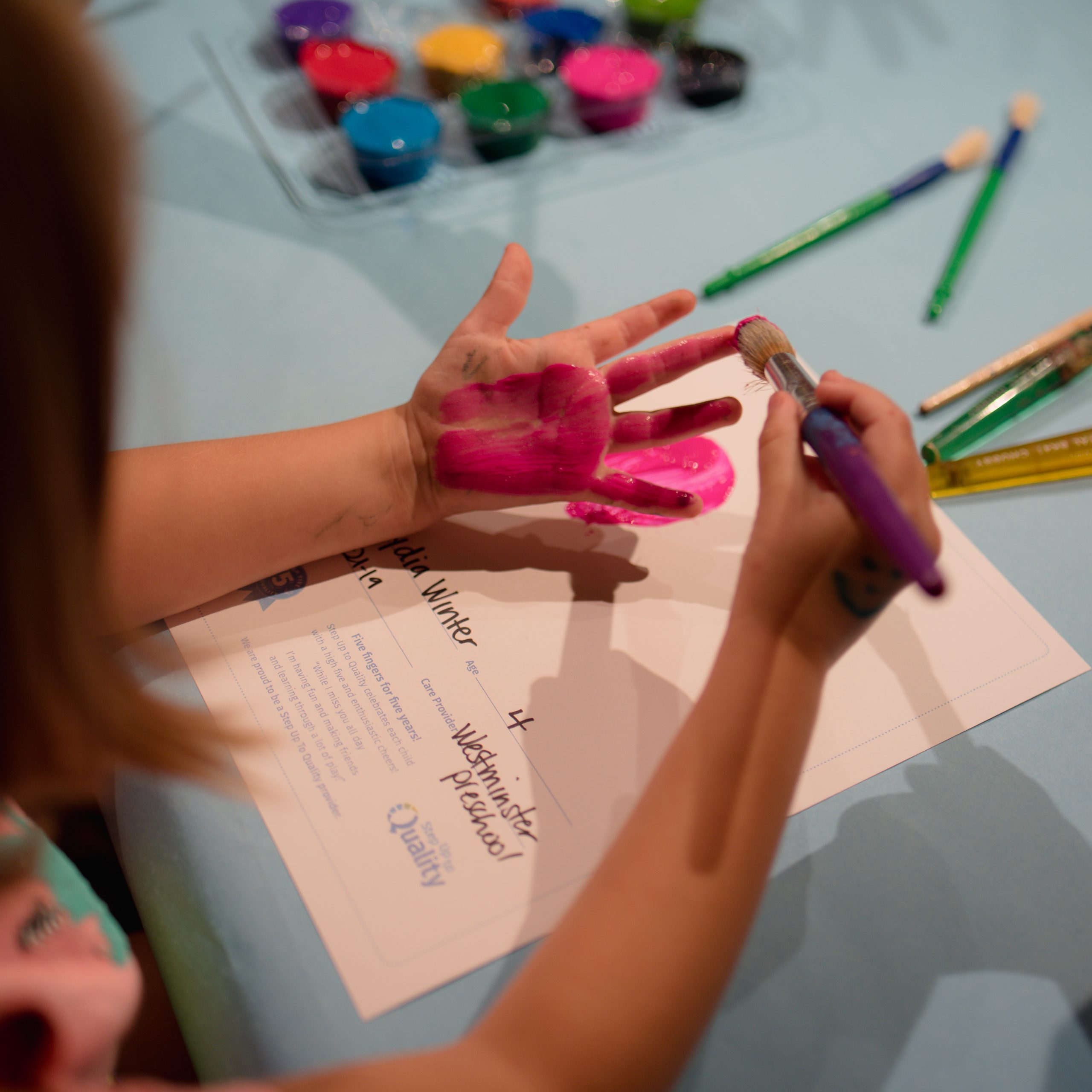
Providers have access to an online kit that gives them tools to promote their involvement in the process, plus Ann makes it a point to share posts that Step Up to Quality is tagged in to help build awareness about programs. She understands how time-consuming social media can be for busy people like child care teachers, directors and owners, but just like within the process itself, Ann is here to help.
“We love hearing from child care providers on social media. We love it when they tag us in their posts and comment on our posts,” she said. “Above all, we want them to know we’re approachable and we want to see them succeed.”
Simple Ways to Advocate for Early Childhood Education Issues
Many people got bitten by the political bug this year – fighting for causes you care about, empowering others to use their voice and seeing change happen within your community (and knowing you had something to do with it) are all rewarding and exhilarating. This engagement is the backbone of democracy – and this kind of activism can be good role modeling behavior for teaching children about civics and stewardship of our country.
With the election over, you may be ready to take on a cause near and dear to your heart: early childhood education.
No Shortage of Issues
Quality early childhood education is a crucial element in our state’s ongoing economic stability and growth. These programs provide early learning opportunities for children, allow parents to participate in the workforce and grow our state’s economy. Despite the obvious importance of the early childhood industry, it is still often one of the most undervalued pieces of our local and state infrastructure. To encourage continued investment in this industry, it is important for people passionate about this field to advocate for policies and legislation that support our children, parents and providers.
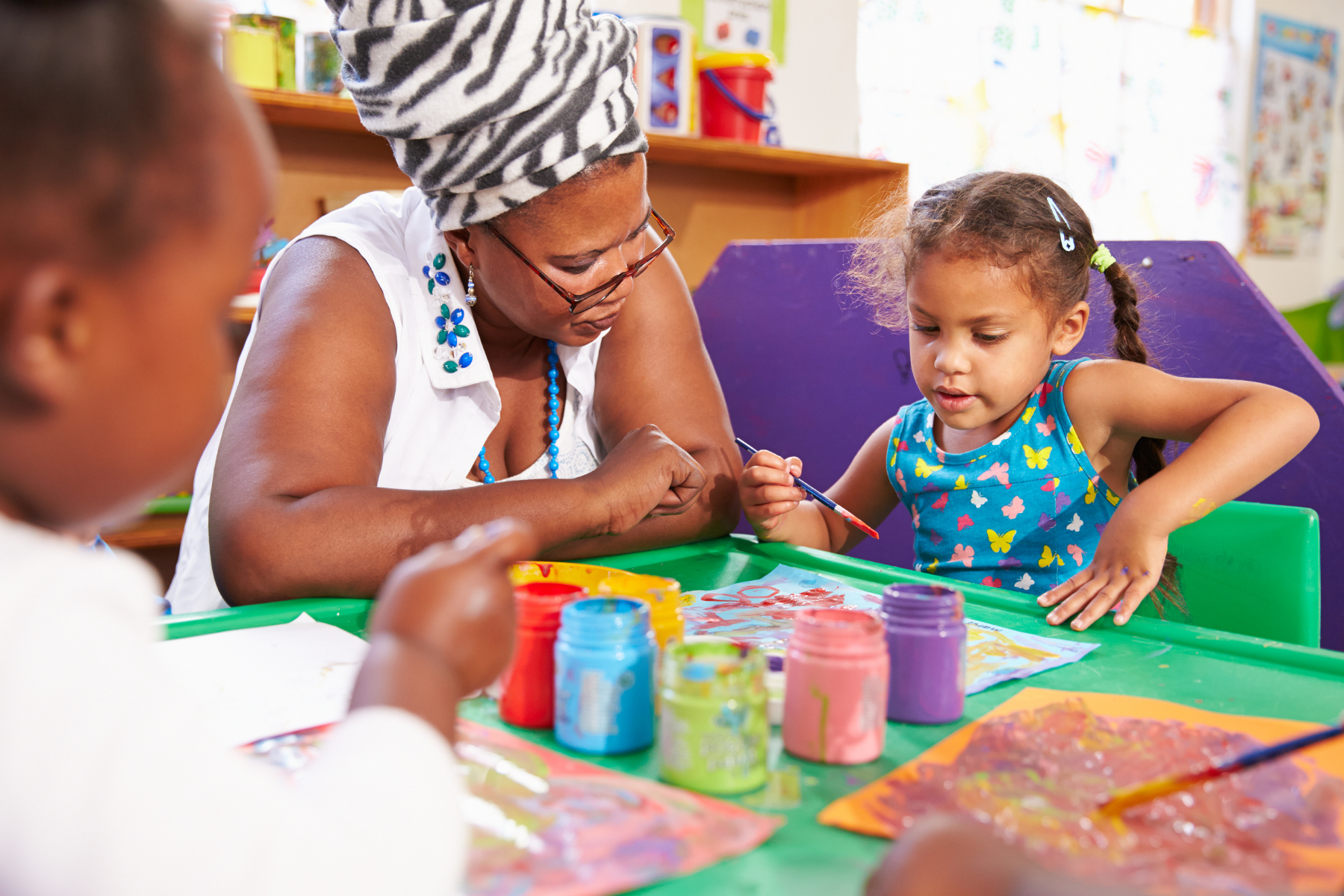
But where do you even start?
Think about some of the barriers in your own life, or inequities you’ve seen or experienced, related to child care. How can decision makers work together to make quality early childhood education available to every child? Consider these topics:
- Educator training
- Parent engagement
- Program standards
- Early intervention for high-risk families
- Child development research
- Cost of child care
- Teacher pay
- Building our future workforce
And there are more topics, of course. Figure out what is most important to you and start with some research. What are other communities doing? What is working? What isn’t working? Put your thoughts down on paper.
Introduce Yourself
Even before you have your ideas organized, reach out to your local elected officials and legislators. Remember, they represent you, so they want to hear from you. It is literally their job to interact with people. Invite your mayor to your child care center. Email your city council representative to introduce yourself. Invite your school board member to chat with you on the phone or online. Ask them about their position and what led them into public service. They’ll want to know about you and what your job or life is like, too. The goal is to simply get to know each other.

Also, reach out to your state senator. In Nebraska, we are fortunate to have a Unicameral, meaning there’s only one body of government for our state, and it’s nonpartisan. Every other state in the country has two governing houses, meaning twice as many people to get to know.
“We just have 49 state senators to get to know and talk to. In New Hampshire, for example, their House of Representatives has 400 senators. I’ve talked with every single Nebraska senator and each of them wants to hear from their constituents,” said First Five Nebraska Deputy Director and Public Policy Manager Elizabeth Lopez Everett.
Deepen Your Knowledge
First Five Nebraska is an advocacy organization focused on changing public policy by changing the public conversation about the importance of quality early childhood education. The organization is a great resource for research, news and expertise in advocacy. They also operate a Nebraska Early Childhood Policy Leadership Academy especially for those who want to learn how to effectively advocate and shape legislative decisions.

The Nebraska Early Childhood Policy Leadership Academy is a non-partisan project focused on helping citizen-leaders better understand and inform early childhood policy in Nebraska. As a participant in this program, you can:
- Deepen your understanding of the policymaking process in state and local government
- Expand your knowledge of demographic, educational and economic factors that affect your community’s growth
- Build a valuable contact network of elected officials, educators, business leaders, civic leaders and others
- Enhance your personal and professional leadership skills through collaborative projects
- Learn how to identify and communicate effectively with strategic influencers and audiences in your community
First Five Nebraska has paused this academy during the pandemic but is hopeful that they can resume it again in 2021. However, they always offer online resources about Nebraska legislation and other topics, plus Elizabeth and her team members are always available to answer questions or offer advice.
“The good news is, we have a strong body of support for early childhood education in our state,” Elizabeth said. “We have great partners, organizations and programs like Step Up to Quality ensuring we’re providing the best start in life for our youngest Nebraskans. But this is just the beginning. We have a lot more room to make improvements, but we need everyone involved.”
Meet the Step Up to Quality Team: Diane Lewis
The Step Up to Quality team is an incredible resource for child care providers going through any of the five Steps – and they can also connect providers with other early childhood education resources. As a part of the State of Nebraska Department of Education’s Office of Early Childhood, the Step Up to Quality team works closely with their colleagues within the government and with partner agencies across the state.
To help providers get to know the people behind Step Up to Quality better, we’re featuring each of the team members and their role. This time we’re featuring Rating Specialist Diane Lewis!
The Growth of an Industry
Child care providers all across the state might recognize Diane Lewis from her time with the Department of Health and Human Services. She began her career on the Child Care Licensing team.
“Back when I started, just three or four of us covered the entire state,” she said.
After a few years, she became the team’s supervisor, and then after a few more she became the Child Care Grant Manager. When Step Up to Quality started, she was on the work group that helped research what other QRIS programs were doing in other states, and helped put together the standards and indicators. She then joined the Department of Education program as the Rating Specialist. In all, she’s spent a total of 36 years employed by the State of Nebraska, all within the realm of child care and early childhood education.
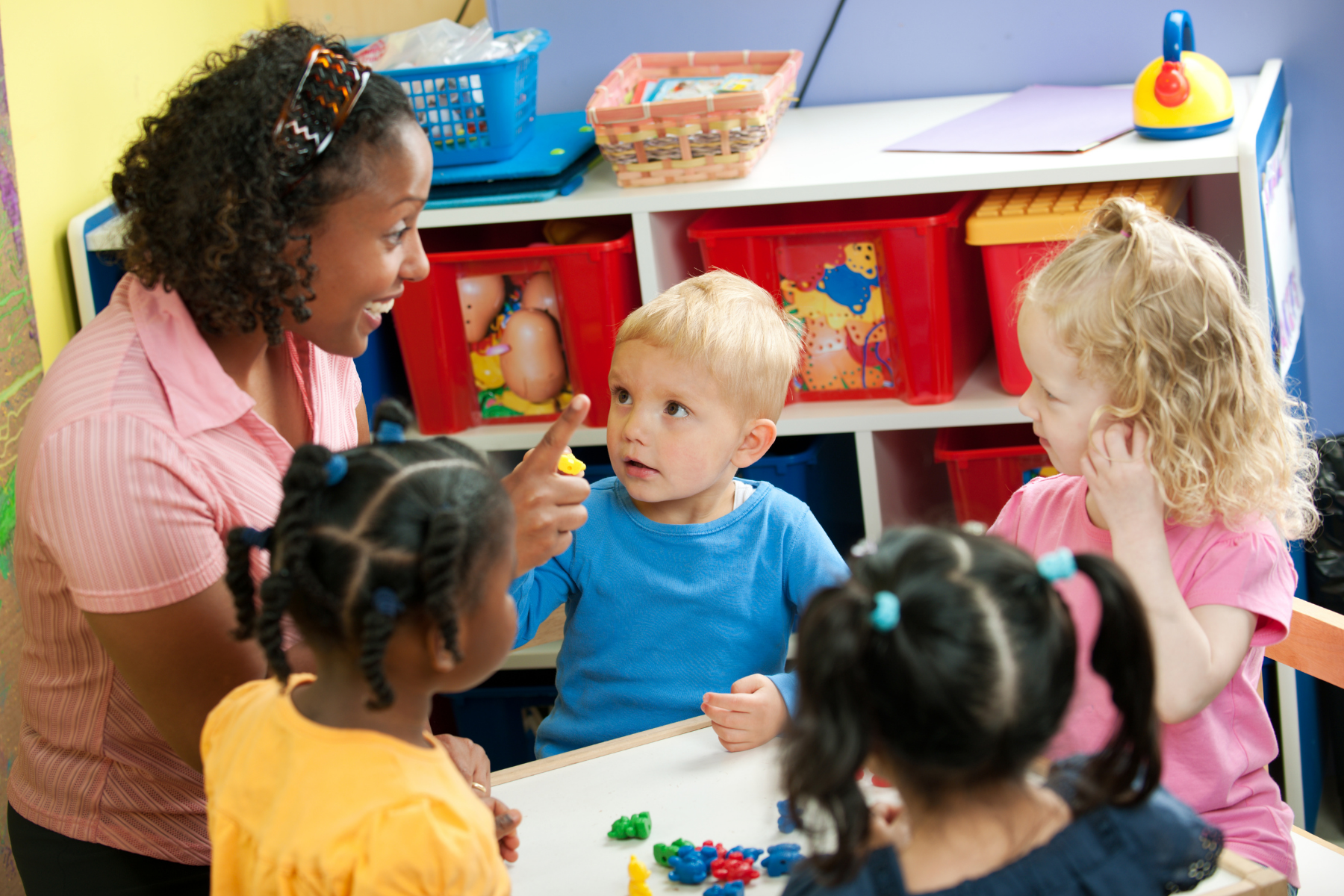
Over the years, she’s seen the appreciation and respect for the profession grow.
“Unfortunately in the beginning, some people thought of child care providers as babysitters,” Diane said. “Now, there’s no doubt that this is an educational field where a tremendous amount of learning happens.”
The Impact of Teachers
Diane knows the difference teachers can make at any age. She grew up in Fremont and earned her psychology degree from the University of Nebraska-Lincoln. She credits her teachers along the way with opening her eyes to different possibilities.
“I can think of so many teachers in my life that helped point me in the right direction and gave me encouragement,” she said.
One of her professors in college steered her in the direction of developmental psychology, which led her to her first job out of school, on the Child Care Licensing team. Her experience visiting child care centers and working with owners, directors and family home providers made her the perfect fit for the Ratings Specialist position on the Step Up to Quality team.
“Everyone on the Step Up to Quality team is in the perfect job for their skill set and personality,” Diane said.

The team works closely together, yet everyone has their own specialty that fits within the path of the program. Diane’s role with the Rating Readiness Tools comes into play during Steps 3-5. She coordinates the efforts of two other ratings reviewers, and between the three of them, they cover the entire state.
“We’re the last folks to visit the child care providers after the observations,” Diane said. “We look at the administrative end – the policies, the training and education levels, things like that. We go through the program’s binders or folders they’ve put together to document their progression and we tally their points based on the indicators they’ve chosen.”
‘You Can Do Hard Things’
Even though Diane’s role comes at the end of the Step Up to Quality journey for many, she celebrates programs at every stage of the process.
“I really applaud every program enrolled in Step Up to Quality – they’re putting in a lot of extra effort for the kids in their care,” she said. “These are programs that want to do more, want to do better for their kids. It’s incredible.”
She admits she has a soft spot for family child care homes, especially when they’re reluctant to participate in Step Up to Quality.
“They’re rocking a baby, feeding a toddler, putting together a crib, planning next week’s meals, all at the same time,” Diane said. “I tell them, ‘You can do hard things. You prove it every day.’ They breeze through these hard days – they can handle the challenges in our program.”
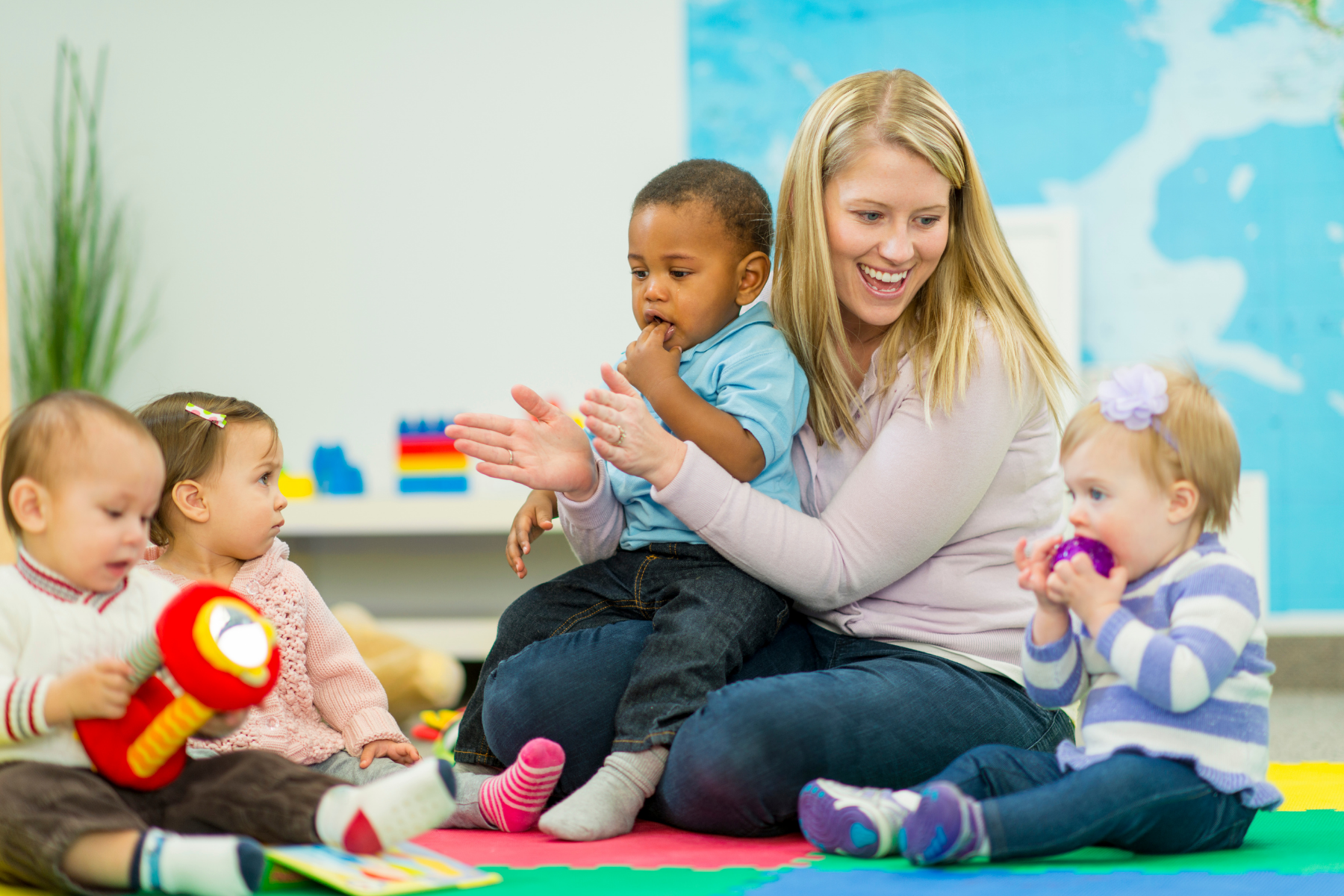
She also encourages child care providers to look at all they themselves can gain from Step Up to Quality.
“We help people discover their strengths and abilities,” Diane said. “I see it all the time, how their confidence builds throughout the process. They grow into their creativity – which helps them teach their kids to grow and learn.”
Ultimately, she appreciates being a part of helping affect the trajectory of a person’s life, from the teacher’s to the child’s.
“People sometimes don’t realize their own potential – they surprise themselves at what they can do,” she said.
Special Tax Credits More Widely Available to Child Care Programs and Teachers
In 2016, Nebraska became just the second state (after Louisiana paved the way) to create tax credits for early childhood education programs and teachers.
“I’ve traveled all over the country to conferences and have visited with experts in the early childhood education field from all over, and I can tell you we are fortunate in Nebraska to have such broad support for early childhood education in our state,” said First Five Nebraska Deputy Director and Public Policy Manager Elizabeth Lopez Everett. First Five Nebraska is an advocacy organization focused on changing public policy by changing the public conversation about the importance of quality early childhood education.

Making the Law More Inclusive
School Readiness Tax Credits give Nebraska child care and preschool programs incentives based on their Step Up to Quality rating, and give teachers personal tax credits based on their education levels, training and experience. The tax credits are determined based on different levels. For individuals, this means anywhere from $532 to $1,597 that can be credited back on state taxes, depending on the amount of points achieved.
“It’s hard to deliver quality child care services while making ends meet,” Elizabeth said. “The revised tax credits are intended to make that a little easier for providers.” When LB 889, the School Readiness Tax Credit Act, became law and was implemented in 2017, it was found that the bill was written in a way that unintentionally excluded some child care providers, most commonly certain kinds of family home child care business owners. Nebraska’s tax code is complex, and the bill didn’t account for a specific classification of businesses. In its first year of being implemented, just $500,000 of these tax credits were used out of a $5 million cap.
When LB 889, the School Readiness Tax Credit Act, became law and was implemented in 2017, it was found that the bill was written in a way that unintentionally excluded some child care providers, most commonly certain kinds of family home child care business owners. Nebraska’s tax code is complex, and the bill didn’t account for a specific classification of businesses. In its first year of being implemented, just $500,000 of these tax credits were used out of a $5 million cap.
First Five Nebraska and other early childhood education advocacy groups recognized this oversight and got to work to make the law more inclusive. They collaborated with the Nebraska Department of Revenue to make the wording align with the tax code, and partnered with State Senator Brett Lindstrom to introduce a “clean up bill” to make it law.
Three days before the legislature adjourned in August, LB 266 was passed, which clarifies the language of the School Readiness Tax Credit Act and makes it possible for all programs and providers to benefit, as long as they meet the basic requirements, which are now completely in their control.
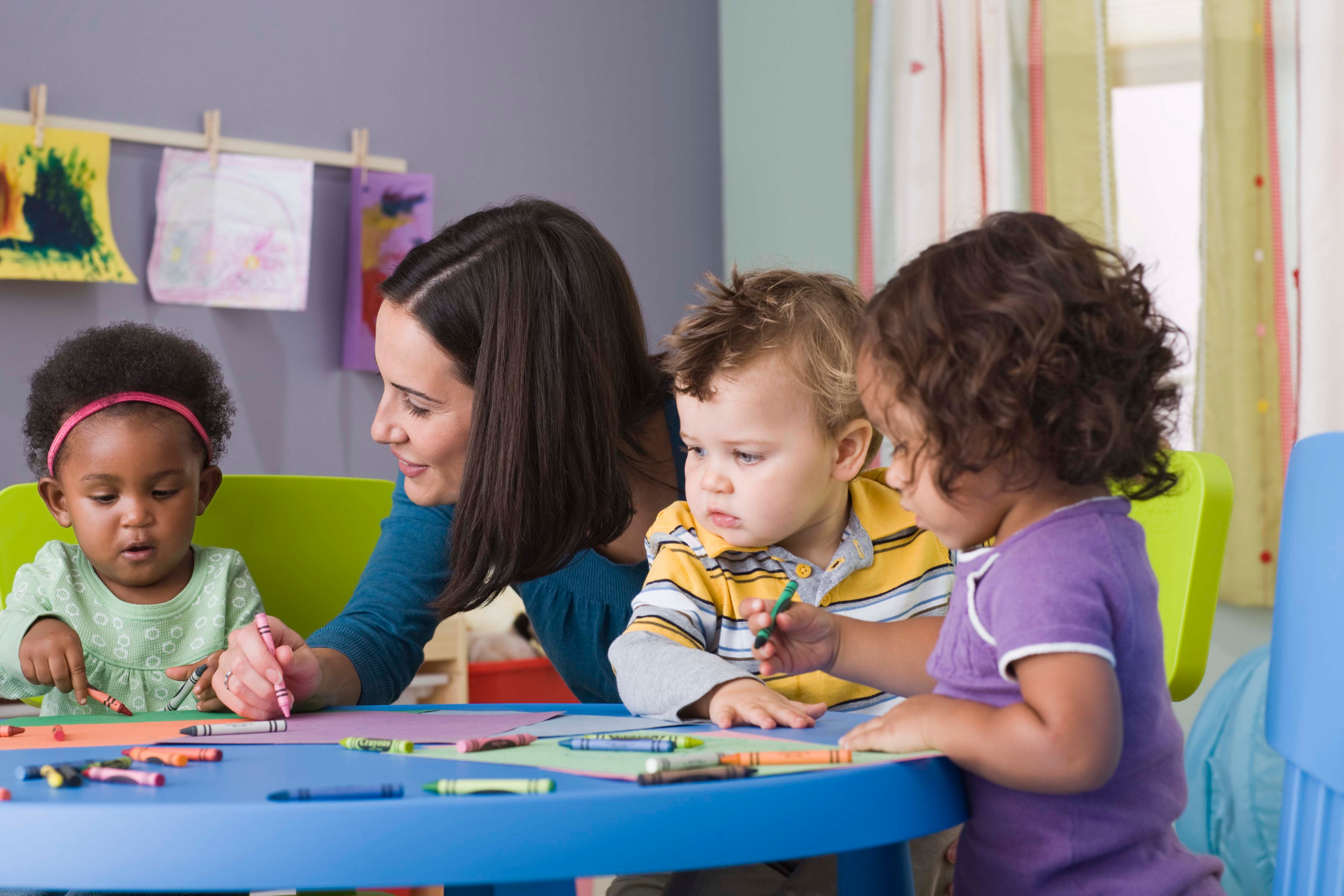
Start Your CDA Today
Unfortunately, the tax credit it not permanent. Qualifying providers can apply the tax credit to their upcoming 2020 and 2021 tax returns, after which the program expires. The more providers who use the credit, the more likely policy leaders will be to extend the program in the future – so now is the time to take advantage of it.
For early childhood education programs, this means enrolling in Step Up to Quality. Individuals must work for a Step Up to Quality-rated program to qualify for this tax credit.
In addition, individuals must have earned a degree or certification in early childhood development. The base requirement is the Child Development Associate (more commonly referred to as the CDA).
Jill Garrett, Early Childhood Program Director at Kids Can in Omaha, encourages all of her full-time staff members to earn their CDA – and all nine have achieved that goal.
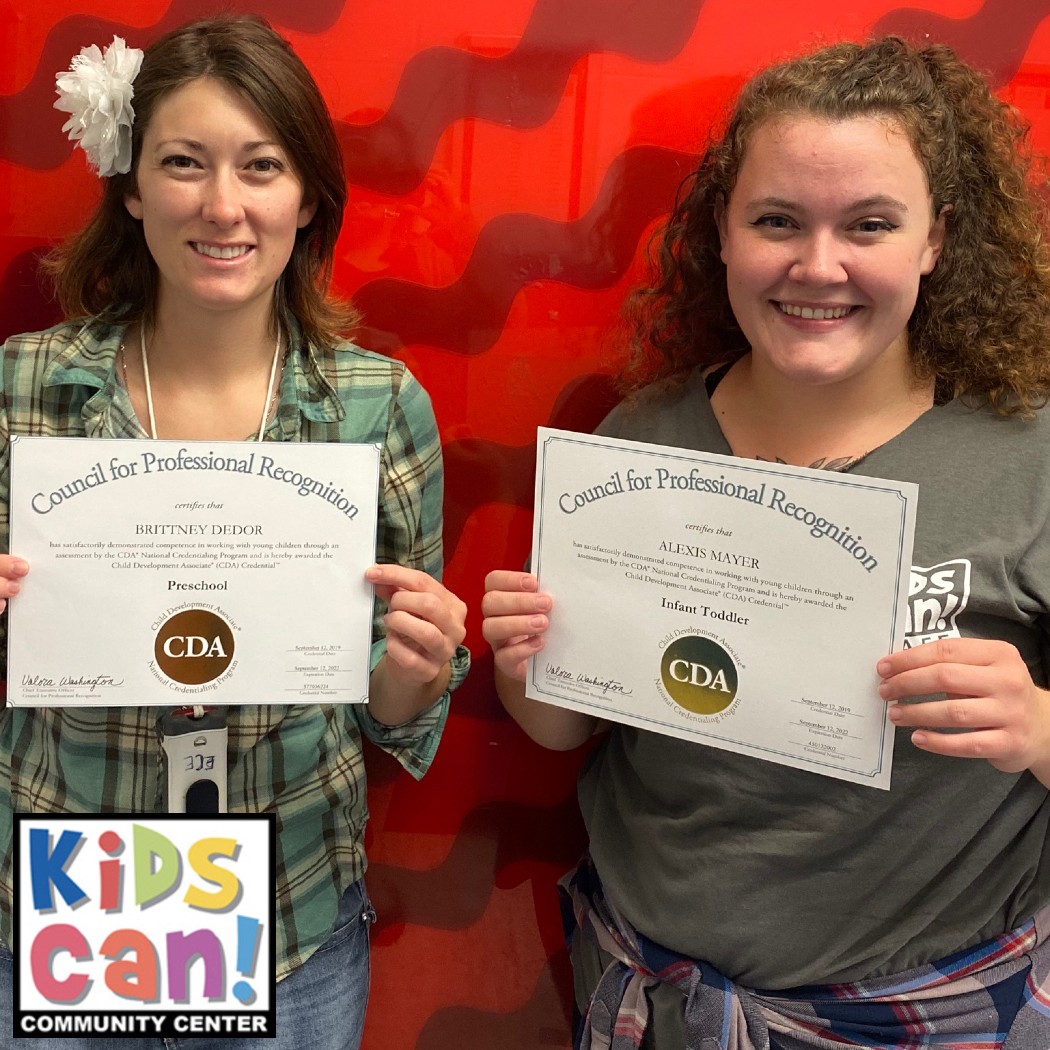
“Obtaining a CDA boosts confidence in care givers,” she said. “It’s achievable and tangible to most educators that are dedicated to making a positive difference in children’s lives.”
Jill said most of her team members have been able to earn the certification in less than a year, making it possible to earn the tax credit quickly, too, because Kids Can is a Step 5 program. She said the tax credit has been meaningful to her entire team, especially during the difficult times related to the pandemic.
“It’s a wonderful recognition of the job they do that often goes unappreciated,” she said. “Child care workers are essential workers. The tax credit shows their work is valued.”
Meet the Step Up to Quality Team: Jenny Fleming
The Step Up to Quality team is an incredible resource for child care providers moving through the process – and they can also connect providers with other early childhood education resources. As a part of the State of Nebraska Department of Education’s Office of Early Childhood, the Step Up to Quality team works closely with their colleagues within the government and with partner agencies across the state.
To help providers get to know the people behind Step Up to Quality better, we’re featuring each of the team members and their role. Let’s get to know Quality Specialist Jenny Fleming a little better!
Generations of Learning & Educating
Teaching might very well be in Jenny Fleming’s blood. Her aunts were teachers, her sister is a teacher, her daughter is on the cusp of becoming one, and Jenny herself taught for many years.
She earned her bachelor’s degree in early childhood education, and she’s spent her entire career in various roles in the field, including as a program director.
“I love all ages, but I am always drawn to the baby room. I love seeing how fast they grow and how much they change,” she said. “When I retire, I want to go rock babies.”
Even at that baby stage, she experienced the strong bonds that can develop between the caregiver and the child.
“It reaffirmed to me how important those early years are,” she said. “And no matter your role in early childhood education, you have an impact.”
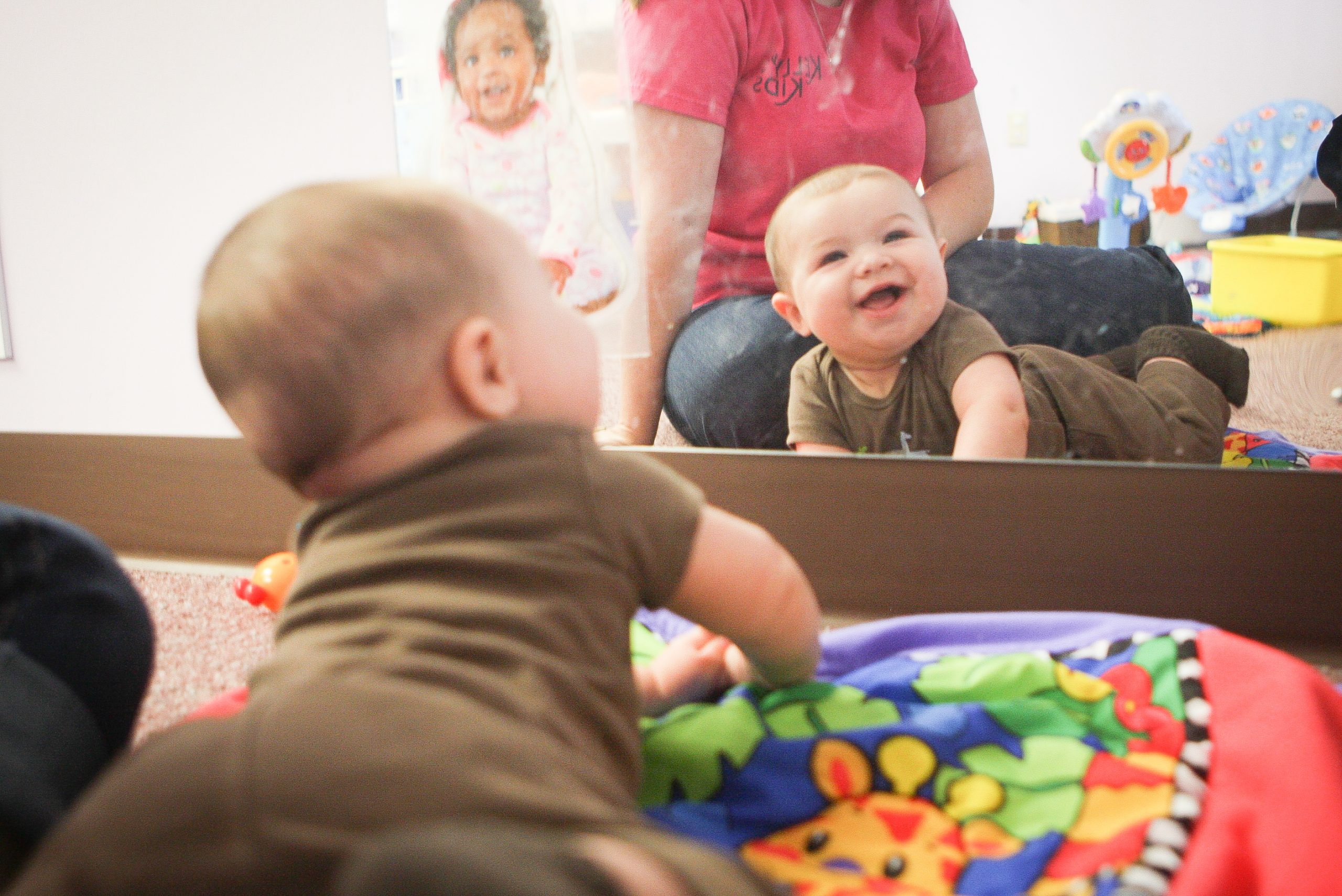
Acute Observations
Jenny joined the Step Up to Quality team in May 2016. She knew about Step Up to Quality because she had participated in a pilot for it as a director of a center, and was eager to contribute to improving the quality of care children receive on a bigger scale.
“The investments we make now and the emotional support we provide early on in children’s lives, we see pay off when they’re grown adults,” she said. “That strong social emotional support system is so important.”
As the Quality Specialist on the Step Up to Quality team, Jenny’s role is mainly centered around the observations, which start at Step 3. She coordinates a team of about 10 early childhood education professionals who are experts in the observation tools and who are contracted to conduct observations at programs who want to continue learning more about improving the quality of their care.
Step Up to Quality uses three versions of Environment Rating Scales (ERS), and three versions of the Classroom Assessment Scoring System (CLASS). Those versions exist to address the differences in various age groups and type of providers being rated, so not all tools are used for every program. Each of the observers have specialized expertise in a certain tool, so Jenny works to match the provider with the most appropriate observer.
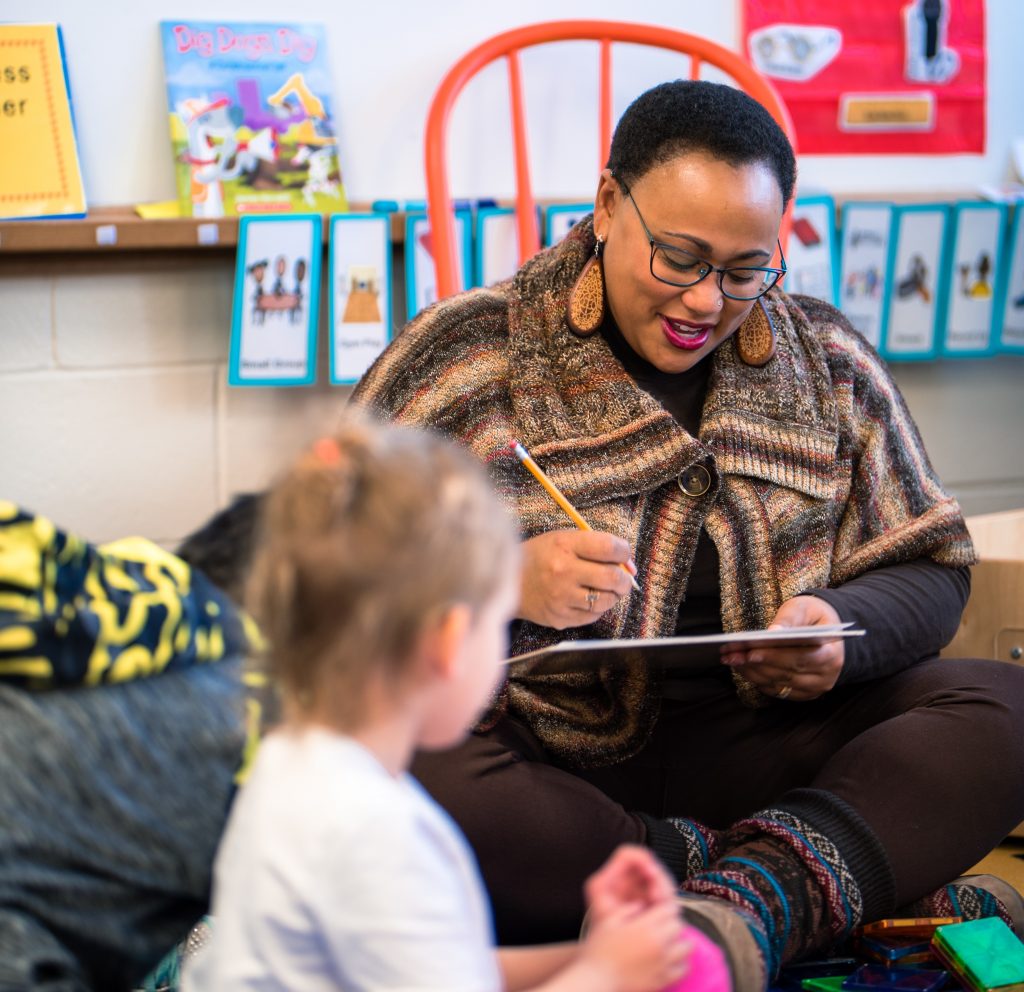
Continuous Improvement
Something that not everyone realizes is that the observers must continuously verify their knowledge of the tools. On every tenth observation, or once a year, an “anchor” accompanies the observer, to make sure the observer’s and the anchor’s scores are aligned.
“We want to make sure the data is as accurate as possible, and that the observers are using the tools to fidelity,” Jenny said.
Providers are matched with an observer once they submit the Rating Readiness Tool after they reach Step 2. Once the form is filled out, Jenny contacts the provider to schedule the observation within three months of the form’s submission.

Jenny knows that providers may be nervous about the idea of someone coming into their space.
“I hear the hesitancy in their voice sometimes,” she said. “I understand that they can be nervous and overwhelmed, but I want them to know this is their opportunity to shine and to show off.”
Above all, she wants providers to know that it’s not about the resulting score.
“Step Up to Quality is about progress. It’s about making these practices second-nature. It’s about growth and support. No matter where you are on the path, there’s always room for improvements,” she said. “And, our whole team has the utmost respect for the work they do. We’re here cheering them on.”



